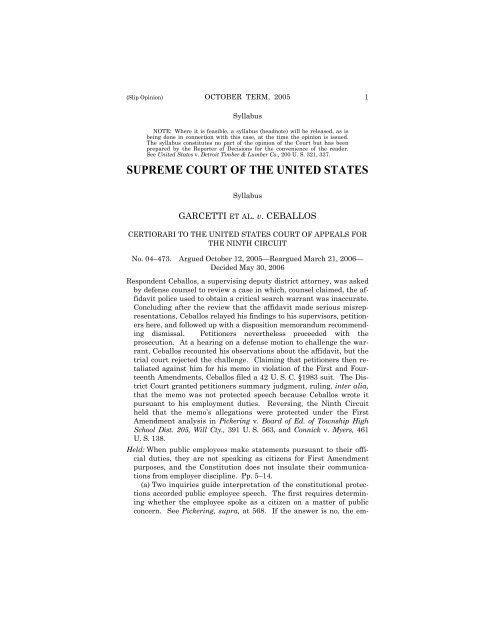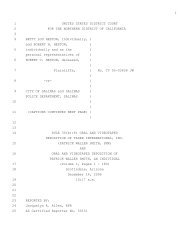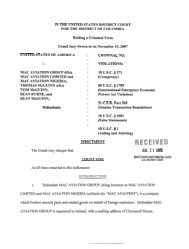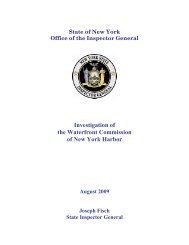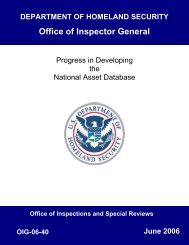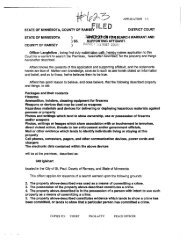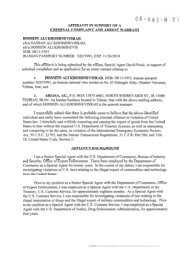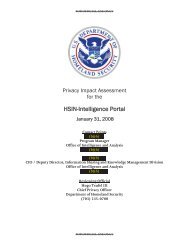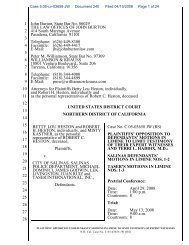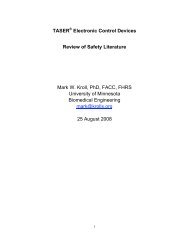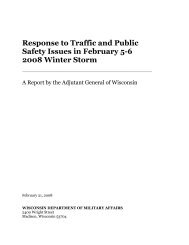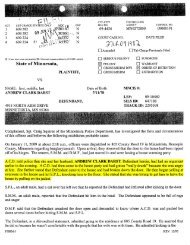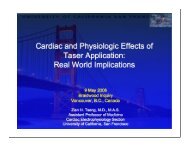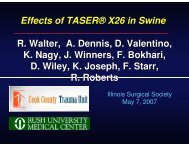04-473 - Garcetti v. Ceballos - Supreme Court of the United States
04-473 - Garcetti v. Ceballos - Supreme Court of the United States
04-473 - Garcetti v. Ceballos - Supreme Court of the United States
You also want an ePaper? Increase the reach of your titles
YUMPU automatically turns print PDFs into web optimized ePapers that Google loves.
(Slip Opinion) OCTOBER TERM, 20051SyllabusNOTE: Where it is feasible, a syllabus (headnote) will be released, as isbeing done in connection with this case, at <strong>the</strong> time <strong>the</strong> opinion is issued.The syllabus constitutes no part <strong>of</strong> <strong>the</strong> opinion <strong>of</strong> <strong>the</strong> <strong>Court</strong> but has beenprepared by <strong>the</strong> Reporter <strong>of</strong> Decisions for <strong>the</strong> convenience <strong>of</strong> <strong>the</strong> reader.See <strong>United</strong> <strong>States</strong> v. Detroit Timber & Lumber Co., 200 U. S. 321, 337.SUPREME COURT OF THE UNITED STATESSyllabusGARCETTI ET AL. v. CEBALLOSCERTIORARI TO THE UNITED STATES COURT OF APPEALS FORTHE NINTH CIRCUITNo. <strong>04</strong>–<strong>473</strong>. Argued October 12, 2005—Reargued March 21, 2006—Decided May 30, 2006 Respondent <strong>Ceballos</strong>, a supervising deputy district attorney, was askedby defense counsel to review a case in which, counsel claimed, <strong>the</strong> affidavitpolice used to obtain a critical search warrant was inaccurate.Concluding after <strong>the</strong> review that <strong>the</strong> affidavit made serious misrepresentations,<strong>Ceballos</strong> relayed his findings to his supervisors, petitionershere, and followed up with a disposition memorandum recommendingdismissal. Petitioners never<strong>the</strong>less proceeded with <strong>the</strong>prosecution. At a hearing on a defense motion to challenge <strong>the</strong> warrant,<strong>Ceballos</strong> recounted his observations about <strong>the</strong> affidavit, but <strong>the</strong>trial court rejected <strong>the</strong> challenge. Claiming that petitioners <strong>the</strong>n retaliatedagainst him for his memo in violation <strong>of</strong> <strong>the</strong> First and FourteenthAmendments, <strong>Ceballos</strong> filed a 42 U. S. C. §1983 suit. The District<strong>Court</strong> granted petitioners summary judgment, ruling, inter alia,that <strong>the</strong> memo was not protected speech because <strong>Ceballos</strong> wrote itpursuant to his employment duties. Reversing, <strong>the</strong> Ninth Circui<strong>the</strong>ld that <strong>the</strong> memo’s allegations were protected under <strong>the</strong> FirstAmendment analysis in Pickering v. Board <strong>of</strong> Ed. <strong>of</strong> Township HighSchool Dist. 205, Will Cty., 391 U. S. 563, and Connick v. Myers, 461U. S. 138.Held: When public employees make statements pursuant to <strong>the</strong>ir <strong>of</strong>ficialduties, <strong>the</strong>y are not speaking as citizens for First Amendmentpurposes, and <strong>the</strong> Constitution does not insulate <strong>the</strong>ir communicationsfrom employer discipline. Pp. 5–14.(a) Two inquiries guide interpretation <strong>of</strong> <strong>the</strong> constitutional protectionsaccorded public employee speech. The first requires determiningwhe<strong>the</strong>r <strong>the</strong> employee spoke as a citizen on a matter <strong>of</strong> publicconcern. See Pickering, supra, at 568. If <strong>the</strong> answer is no, <strong>the</strong> em-
2 GARCETTI v. CEBALLOSSyllabusployee has no First Amendment cause <strong>of</strong> action based on <strong>the</strong> employer’sreaction to <strong>the</strong> speech. See Connick, supra, at 147. If <strong>the</strong>answer is yes, <strong>the</strong> possibility <strong>of</strong> a First Amendment claim arises. Thequestion becomes whe<strong>the</strong>r <strong>the</strong> government employer had an adequatejustification for treating <strong>the</strong> employee differently from anyo<strong>the</strong>r member <strong>of</strong> <strong>the</strong> general public. See Pickering, supra, at 568.This consideration reflects <strong>the</strong> importance <strong>of</strong> <strong>the</strong> relationship between<strong>the</strong> speaker’s expressions and employment. Without a significantdegree <strong>of</strong> control over its employees’ words and actions, a governmentemployer would have little chance to provide public servicesefficiently. Cf. Connick, supra, at 143. Thus, a government entityhas broader discretion to restrict speech when it acts in its employerrole, but <strong>the</strong> restrictions it imposes must be directed at speech thathas some potential to affect its operations. On <strong>the</strong> o<strong>the</strong>r hand, a citizenwho works for <strong>the</strong> government is none<strong>the</strong>less still a citizen. TheFirst Amendment limits a public employer’s ability to leverage <strong>the</strong>employment relationship to restrict, incidentally or intentionally, <strong>the</strong>liberties employees enjoy in <strong>the</strong>ir capacities as private citizens. SeePerry v. Sindermann, 408 U. S. 593, 597. So long as employees arespeaking as citizens about matters <strong>of</strong> public concern, <strong>the</strong>y must faceonly those speech restrictions that are necessary for <strong>the</strong>ir employersto operate efficiently and effectively. See, e.g., Connick, supra, at147. Pp. 5–8.(b) Proper application <strong>of</strong> <strong>the</strong> <strong>Court</strong>’s precedents leads to <strong>the</strong> conclusionthat <strong>the</strong> First Amendment does not prohibit managerial disciplinebased on an employee’s expressions made pursuant to <strong>of</strong>ficialresponsibilities. Because <strong>Ceballos</strong>’ memo falls into this category, hisallegation <strong>of</strong> unconstitutional retaliation must fail. The dispositivefactor here is not that <strong>Ceballos</strong> expressed his views inside his <strong>of</strong>fice,ra<strong>the</strong>r than publicly, see, e.g., Givhan v. Western Line Consol. SchoolDist., 439 U. S. 410, 414, nor that <strong>the</strong> memo concerned <strong>the</strong> subject matter<strong>of</strong> his employment, see, e.g., Pickering, 391 U. S, at 573. Ra<strong>the</strong>r, <strong>the</strong>controlling factor is that <strong>Ceballos</strong>’ expressions were made pursuant tohis <strong>of</strong>ficial duties. That consideration distinguishes this case fromthose in which <strong>the</strong> First Amendment provides protection against discipline.<strong>Ceballos</strong> wrote his disposition memo because that is part <strong>of</strong>what he was employed to do. He did not act as a citizen by writing it.The fact that his duties sometimes required him to speak or writedoes not mean his supervisors were prohibited from evaluating hisperformance. Restricting speech that owes its existence to a publicemployee’s pr<strong>of</strong>essional responsibilities does not infringe any liberties<strong>the</strong> employee might have enjoyed as a private citizen. It simply reflects<strong>the</strong> exercise <strong>of</strong> employer control over what <strong>the</strong> employer itselfhas commissioned or created. Cf. Rosenberger v. Rector and Visitors
Cite as: 547 U. S. ____ (2006)3Syllabus<strong>of</strong> Univ. <strong>of</strong> Va., 515 U. S. 819, 833. This result is consistent with <strong>the</strong><strong>Court</strong>’s prior emphasis on <strong>the</strong> potential societal value <strong>of</strong> employeespeech and on affording government employers sufficient discretion tomanage <strong>the</strong>ir operations. <strong>Ceballos</strong>’ proposed contrary rule, adopted by<strong>the</strong> Ninth Circuit, would commit state and federal courts to a new,permanent, and intrusive role, mandating judicial oversight <strong>of</strong> communicationsbetween and among government employees and <strong>the</strong>irsuperiors in <strong>the</strong> course <strong>of</strong> <strong>of</strong>ficial business. This displacement <strong>of</strong>managerial discretion by judicial supervision finds no support in <strong>the</strong><strong>Court</strong>’s precedents. The doctrinal anomaly <strong>the</strong> <strong>Court</strong> <strong>of</strong> Appeals perceivedin compelling public employers to tolerate certain employeespeech made publicly but not speech made pursuant to an employee’sassigned duties misconceives <strong>the</strong> <strong>the</strong>oretical underpinnings <strong>of</strong> this<strong>Court</strong>’s decisions and is unfounded as a practical matter. Pp. 8–13.(c) Exposing governmental inefficiency and misconduct is a matter<strong>of</strong> considerable significance, and various measures have been adoptedto protect employees and provide checks on supervisors who would orderunlawful or o<strong>the</strong>rwise inappropriate actions. These include federaland state whistle-blower protection laws and labor codes and, for governmentattorneys, rules <strong>of</strong> conduct and constitutional obligationsapart from <strong>the</strong> First Amendment. However, <strong>the</strong> <strong>Court</strong>’s precedentsdo not support <strong>the</strong> existence <strong>of</strong> a constitutional cause <strong>of</strong> action behindevery statement a public employee makes in <strong>the</strong> course <strong>of</strong> doing hisor her job. Pp. 13–14.361 F. 3d 1168, reversed and remanded.KENNEDY, J., delivered <strong>the</strong> opinion <strong>of</strong> <strong>the</strong> <strong>Court</strong>, in which ROBERTS,C. J., and SCALIA, THOMAS, and ALITO, JJ., joined. STEVENS, J., filed adissenting opinion. SOUTER, J., filed a dissenting opinion, in whichSTEVENS and GINSBURG, JJ., joined. BREYER, J., filed a dissentingopinion.
Cite as: 547 U. S. ____ (2006)1Opinion <strong>of</strong> <strong>the</strong> <strong>Court</strong>NOTICE: This opinion is subject to formal revision before publication in <strong>the</strong>preliminary print <strong>of</strong> <strong>the</strong> <strong>United</strong> <strong>States</strong> Reports. Readers are requested tonotify <strong>the</strong> Reporter <strong>of</strong> Decisions, <strong>Supreme</strong> <strong>Court</strong> <strong>of</strong> <strong>the</strong> <strong>United</strong> <strong>States</strong>, Washington,D. C. 20543, <strong>of</strong> any typographical or o<strong>the</strong>r formal errors, in orderthat corrections may be made before <strong>the</strong> preliminary print goes to press.SUPREME COURT OF THE UNITED STATES_________________No. <strong>04</strong>–<strong>473</strong>_________________GIL GARCETTI, ET AL., PETITIONERS v. RICHARD CEBALLOS ON WRIT OF CERTIORARI TO THE UNITED STATES COURT OF APPEALS FOR THE NINTH CIRCUIT[May 30, 2006] JUSTICE KENNEDY delivered <strong>the</strong> opinion <strong>of</strong> <strong>the</strong> <strong>Court</strong>.It is well settled that “a State cannot condition publicemployment on a basis that infringes <strong>the</strong> employee’sconstitutionally protected interest in freedom <strong>of</strong> expression.”Connick v. Myers, 461 U. S. 138, 142 (1983). Thequestion presented by <strong>the</strong> instant case is whe<strong>the</strong>r <strong>the</strong>First Amendment protects a government employee fromdiscipline based on speech made pursuant to <strong>the</strong> employee’s<strong>of</strong>ficial duties.IRespondent Richard <strong>Ceballos</strong> has been employed since1989 as a deputy district attorney for <strong>the</strong> Los AngelesCounty District Attorney’s Office. During <strong>the</strong> periodrelevant to this case, <strong>Ceballos</strong> was a calendar deputy in<strong>the</strong> <strong>of</strong>fice’s Pomona branch, and in this capacity he exercisedcertain supervisory responsibilities over o<strong>the</strong>r lawyers.In February 2000, a defense attorney contacted<strong>Ceballos</strong> about a pending criminal case. The defenseattorney said <strong>the</strong>re were inaccuracies in an affidavit usedto obtain a critical search warrant. The attorney informed<strong>Ceballos</strong> that he had filed a motion to traverse, or chal-
2 GARCETTI v. CEBALLOSOpinion <strong>of</strong> <strong>the</strong> <strong>Court</strong>lenge, <strong>the</strong> warrant, but he also wanted <strong>Ceballos</strong> to review<strong>the</strong> case. According to <strong>Ceballos</strong>, it was not unusual fordefense attorneys to ask calendar deputies to investigateaspects <strong>of</strong> pending cases.After examining <strong>the</strong> affidavit and visiting <strong>the</strong> location itdescribed, <strong>Ceballos</strong> determined <strong>the</strong> affidavit containedserious misrepresentations. The affidavit called a longdriveway what <strong>Ceballos</strong> thought should have been referredto as a separate roadway. <strong>Ceballos</strong> also questioned<strong>the</strong> affidavit’s statement that tire tracks led from astripped-down truck to <strong>the</strong> premises covered by <strong>the</strong> warrant.His doubts arose from his conclusion that <strong>the</strong> roadway’scomposition in some places made it difficult or impossibleto leave visible tire tracks.<strong>Ceballos</strong> spoke on <strong>the</strong> telephone to <strong>the</strong> warrant affiant,a deputy sheriff from <strong>the</strong> Los Angeles County Sheriff’sDepartment, but he did not receive a satisfactory explanationfor <strong>the</strong> perceived inaccuracies. He relayed his findingsto his supervisors, petitioners Carol Najera and FrankSundstedt, and followed up by preparing a dispositionmemorandum. The memo explained <strong>Ceballos</strong>’ concerns andrecommended dismissal <strong>of</strong> <strong>the</strong> case. On March 2, 2000,<strong>Ceballos</strong> submitted <strong>the</strong> memo to Sundstedt for his review.A few days later, <strong>Ceballos</strong> presented Sundstedt with ano<strong>the</strong>rmemo, this one describing a second telephone conversationbetween <strong>Ceballos</strong> and <strong>the</strong> warrant affiant.Based on <strong>Ceballos</strong>’ statements, a meeting was held to discuss<strong>the</strong> affidavit. Attendees included <strong>Ceballos</strong>, Sundstedt,and Najera, as well as <strong>the</strong> warrant affiant and o<strong>the</strong>r employeesfrom <strong>the</strong> sheriff’s department. The meeting allegedlybecame heated, with one lieutenant sharply criticizing<strong>Ceballos</strong> for his handling <strong>of</strong> <strong>the</strong> case.Despite <strong>Ceballos</strong>’ concerns, Sundstedt decided to proceedwith <strong>the</strong> prosecution, pending disposition <strong>of</strong> <strong>the</strong>defense motion to traverse. The trial court held a hearingon <strong>the</strong> motion. <strong>Ceballos</strong> was called by <strong>the</strong> defense and
Cite as: 547 U. S. ____ (2006)3Opinion <strong>of</strong> <strong>the</strong> <strong>Court</strong>recounted his observations about <strong>the</strong> affidavit, but <strong>the</strong>trial court rejected <strong>the</strong> challenge to <strong>the</strong> warrant.<strong>Ceballos</strong> claims that in <strong>the</strong> aftermath <strong>of</strong> <strong>the</strong>se events hewas subjected to a series <strong>of</strong> retaliatory employment actions.The actions included reassignment from his calendar deputyposition to a trial deputy position, transfer to ano<strong>the</strong>rcourthouse, and denial <strong>of</strong> a promotion. <strong>Ceballos</strong> initiatedan employment grievance, but <strong>the</strong> grievance was deniedbased on a finding that he had not suffered any retaliation.Unsatisfied, <strong>Ceballos</strong> sued in <strong>the</strong> <strong>United</strong> <strong>States</strong> District<strong>Court</strong> for <strong>the</strong> Central District <strong>of</strong> California, asserting, asrelevant here, a claim under Rev. Stat. §1979, 42 U. S. C.§1983. He alleged petitioners violated <strong>the</strong> First and FourteenthAmendments by retaliating against him based onhis memo <strong>of</strong> March 2.Petitioners responded that no retaliatory actions weretaken against <strong>Ceballos</strong> and that all <strong>the</strong> actions <strong>of</strong> which hecomplained were explained by legitimate reasons such asstaffing needs. They fur<strong>the</strong>r contended that, in any event,<strong>Ceballos</strong>’ memo was not protected speech under <strong>the</strong> FirstAmendment. Petitioners moved for summary judgment,and <strong>the</strong> District <strong>Court</strong> granted <strong>the</strong>ir motion. Noting that<strong>Ceballos</strong> wrote his memo pursuant to his employmentduties, <strong>the</strong> court concluded he was not entitled to FirstAmendment protection for <strong>the</strong> memo’s contents. It held in<strong>the</strong> alternative that even if <strong>Ceballos</strong>’ speech was constitutionallyprotected, petitioners had qualified immunitybecause <strong>the</strong> rights <strong>Ceballos</strong> asserted were not clearlyestablished.The <strong>Court</strong> <strong>of</strong> Appeals for <strong>the</strong> Ninth Circuit reversed,holding that “<strong>Ceballos</strong>’s allegations <strong>of</strong> wrongdoing in <strong>the</strong>memorandum constitute protected speech under <strong>the</strong> FirstAmendment.” 361 F. 3d 1168, 1173 (20<strong>04</strong>). In reachingits conclusion <strong>the</strong> court looked to <strong>the</strong> First Amendmentanalysis set forth in Pickering v. Board <strong>of</strong> Ed. <strong>of</strong> TownshipHigh School Dist. 205, Will Cty., 391 U. S. 563 (1968), and
4 GARCETTI v. CEBALLOSOpinion <strong>of</strong> <strong>the</strong> <strong>Court</strong>Connick, 461 U. S. 138. Connick instructs courts to begin byconsidering whe<strong>the</strong>r <strong>the</strong> expressions in question were madeby <strong>the</strong> speaker “as a citizen upon matters <strong>of</strong> public concern.”See id., at 146–147. The <strong>Court</strong> <strong>of</strong> Appeals determined that<strong>Ceballos</strong>’ memo, which recited what he thought to be governmentalmisconduct, was “inherently a matter <strong>of</strong> publicconcern.” 361 F. 3d, at 1174. The court did not, however,consider whe<strong>the</strong>r <strong>the</strong> speech was made in <strong>Ceballos</strong>’ capacityas a citizen. Ra<strong>the</strong>r, it relied on Circuit precedent rejecting<strong>the</strong> idea that “a public employee’s speech is deprived <strong>of</strong> FirstAmendment protection whenever those views are expressed,to government workers or o<strong>the</strong>rs, pursuant to an employmentresponsibility.” Id., at 1174–1175 (citing cases includingRoth v. Veteran’s Admin. <strong>of</strong> Govt. <strong>of</strong> <strong>United</strong> <strong>States</strong>, 856F. 2d 1401 (CA9 1988)).Having concluded that <strong>Ceballos</strong>’ memo satisfied <strong>the</strong>public-concern requirement, <strong>the</strong> <strong>Court</strong> <strong>of</strong> Appeals proceededto balance <strong>Ceballos</strong>’ interest in his speech againsthis supervisors’ interest in responding to it. See Pickering,supra, at 568. The court struck <strong>the</strong> balance in <strong>Ceballos</strong>’favor, noting that petitioners “failed even to suggest disruptionor inefficiency in <strong>the</strong> workings <strong>of</strong> <strong>the</strong> DistrictAttorney’s Office” as a result <strong>of</strong> <strong>the</strong> memo. See 361 F. 3d,at 1180. The court fur<strong>the</strong>r concluded that <strong>Ceballos</strong>’ FirstAmendment rights were clearly established and thatpetitioners’ actions were not objectively reasonable. Seeid., at 1181–1182.Judge O’Scannlain specially concurred. Agreeing that<strong>the</strong> panel’s decision was compelled by Circuit precedent,he never<strong>the</strong>less concluded Circuit law should be revisitedand overruled. See id., at 1185. Judge O’Scannlain emphasized<strong>the</strong> distinction “between speech <strong>of</strong>fered by apublic employee acting as an employee carrying out his orher ordinary job duties and that spoken by an employeeacting as a citizen expressing his or her personal views ondisputed matters <strong>of</strong> public import.” Id., at 1187. In his
Cite as: 547 U. S. ____ (2006)5Opinion <strong>of</strong> <strong>the</strong> <strong>Court</strong>view, “when public employees speak in <strong>the</strong> course <strong>of</strong> carryingout <strong>the</strong>ir routine, required employment obligations,<strong>the</strong>y have no personal interest in <strong>the</strong> content <strong>of</strong> that speechthat gives rise to a First Amendment right.” Id., at 1189.We granted certiorari, 543 U. S. 1186 (2005), and wenow reverse.IIAs <strong>the</strong> <strong>Court</strong>’s decisions have noted, for many years “<strong>the</strong>unchallenged dogma was that a public employee had noright to object to conditions placed upon <strong>the</strong> terms <strong>of</strong>employment—including those which restricted <strong>the</strong> exercise<strong>of</strong> constitutional rights.” Connick, 461 U. S., at 143.That dogma has been qualified in important respects. Seeid., at 144–145. The <strong>Court</strong> has made clear that publicemployees do not surrender all <strong>the</strong>ir First Amendmentrights by reason <strong>of</strong> <strong>the</strong>ir employment. Ra<strong>the</strong>r, <strong>the</strong> FirstAmendment protects a public employee’s right, in certaincircumstances, to speak as a citizen addressing matters <strong>of</strong>public concern. See, e.g., Pickering, supra, at 568; Connick,supra, at 147; Rankin v. McPherson, 483 U. S. 378, 384(1987); <strong>United</strong> <strong>States</strong> v. Treasury Employees, 513 U. S.454, 466 (1995).Pickering provides a useful starting point in explaining<strong>the</strong> <strong>Court</strong>’s doctrine. There <strong>the</strong> relevant speech was ateacher’s letter to a local newspaper addressing issuesincluding <strong>the</strong> funding policies <strong>of</strong> his school board. 391U. S., at 566. “The problem in any case,” <strong>the</strong> <strong>Court</strong> stated,“is to arrive at a balance between <strong>the</strong> interests <strong>of</strong> <strong>the</strong>teacher, as a citizen, in commenting upon matters <strong>of</strong> publicconcern and <strong>the</strong> interest <strong>of</strong> <strong>the</strong> State, as an employer, inpromoting <strong>the</strong> efficiency <strong>of</strong> <strong>the</strong> public services it performsthrough its employees.” Id., at 568. The <strong>Court</strong> found <strong>the</strong>teacher’s speech “nei<strong>the</strong>r [was] shown nor can be presumedto have in any way ei<strong>the</strong>r impeded <strong>the</strong> teacher’sproper performance <strong>of</strong> his daily duties in <strong>the</strong> classroom or
6 GARCETTI v. CEBALLOSOpinion <strong>of</strong> <strong>the</strong> <strong>Court</strong>to have interfered with <strong>the</strong> regular operation <strong>of</strong> <strong>the</strong> schoolsgenerally.” Id., at 572–573 (footnote omitted). Thus, <strong>the</strong><strong>Court</strong> concluded that “<strong>the</strong> interest <strong>of</strong> <strong>the</strong> school administrationin limiting teachers’ opportunities to contribute topublic debate is not significantly greater than its interestin limiting a similar contribution by any member <strong>of</strong> <strong>the</strong>general public.” Id., at 573.Pickering and <strong>the</strong> cases decided in its wake identify twoinquiries to guide interpretation <strong>of</strong> <strong>the</strong> constitutionalprotections accorded to public employee speech. The firstrequires determining whe<strong>the</strong>r <strong>the</strong> employee spoke as acitizen on a matter <strong>of</strong> public concern. See id., at 568. If<strong>the</strong> answer is no, <strong>the</strong> employee has no First Amendmentcause <strong>of</strong> action based on his or her employer’s reaction to<strong>the</strong> speech. See Connick, supra, at 147. If <strong>the</strong> answer isyes, <strong>the</strong>n <strong>the</strong> possibility <strong>of</strong> a First Amendment claimarises. The question becomes whe<strong>the</strong>r <strong>the</strong> relevant governmententity had an adequate justification for treating<strong>the</strong> employee differently from any o<strong>the</strong>r member <strong>of</strong> <strong>the</strong>general public. See Pickering, 391 U. S., at 568. Thisconsideration reflects <strong>the</strong> importance <strong>of</strong> <strong>the</strong> relationshipbetween <strong>the</strong> speaker’s expressions and employment. Agovernment entity has broader discretion to restrictspeech when it acts in its role as employer, but <strong>the</strong> restrictionsit imposes must be directed at speech that has somepotential to affect <strong>the</strong> entity’s operations.To be sure, conducting <strong>the</strong>se inquiries sometimes hasproved difficult. This is <strong>the</strong> necessary product <strong>of</strong> “<strong>the</strong> enormousvariety <strong>of</strong> fact situations in which critical statementsby teachers and o<strong>the</strong>r public employees may be thought by<strong>the</strong>ir superiors . . . to furnish grounds for dismissal.” Id., at569. The <strong>Court</strong>’s overarching objectives, though, are evident.When a citizen enters government service, <strong>the</strong> citizen bynecessity must accept certain limitations on his or herfreedom. See, e.g., Waters v. Churchill, 511 U. S. 661, 671(1994) (plurality opinion) (“[T]he government as employer
Cite as: 547 U. S. ____ (2006)7Opinion <strong>of</strong> <strong>the</strong> <strong>Court</strong>indeed has far broader powers than does <strong>the</strong> governmentas sovereign”). Government employers, like private employers,need a significant degree <strong>of</strong> control over <strong>the</strong>iremployees’ words and actions; without it, <strong>the</strong>re would belittle chance for <strong>the</strong> efficient provision <strong>of</strong> public services.Cf. Connick, supra, at 143 (“[G]overnment <strong>of</strong>fices could notfunction if every employment decision became a constitutionalmatter”). Public employees, moreover, <strong>of</strong>ten occupytrusted positions in society. When <strong>the</strong>y speak out, <strong>the</strong>y canexpress views that contravene governmental policies orimpair <strong>the</strong> proper performance <strong>of</strong> governmental functions.At <strong>the</strong> same time, <strong>the</strong> <strong>Court</strong> has recognized that a citizenwho works for <strong>the</strong> government is none<strong>the</strong>less a citizen.The First Amendment limits <strong>the</strong> ability <strong>of</strong> a public employerto leverage <strong>the</strong> employment relationship to restrict,incidentally or intentionally, <strong>the</strong> liberties employees enjoyin <strong>the</strong>ir capacities as private citizens. See Perry v. Sindermann,408 U. S. 593, 597 (1972). So long as employees arespeaking as citizens about matters <strong>of</strong> public concern, <strong>the</strong>ymust face only those speech restrictions that are necessaryfor <strong>the</strong>ir employers to operate efficiently and effectively.See, e.g., Connick, supra, at 147 (“Our responsibility is toensure that citizens are not deprived <strong>of</strong> fundamentalrights by virtue <strong>of</strong> working for <strong>the</strong> government”).The <strong>Court</strong>’s employee-speech jurisprudence protects, <strong>of</strong>course, <strong>the</strong> constitutional rights <strong>of</strong> public employees. Yet<strong>the</strong> First Amendment interests at stake extend beyond <strong>the</strong>individual speaker. The <strong>Court</strong> has acknowledged <strong>the</strong>importance <strong>of</strong> promoting <strong>the</strong> public’s interest in receiving<strong>the</strong> well-informed views <strong>of</strong> government employees engagingin civic discussion. Pickering again provides an instructiveexample. The <strong>Court</strong> characterized its holding asrejecting <strong>the</strong> attempt <strong>of</strong> school administrators to “limi[t]teachers’ opportunities to contribute to public debate.”391 U. S., at 573. It also noted that teachers are “<strong>the</strong>members <strong>of</strong> a community most likely to have informed and
8 GARCETTI v. CEBALLOSOpinion <strong>of</strong> <strong>the</strong> <strong>Court</strong>definite opinions” about school expenditures. Id., at 572.The <strong>Court</strong>’s approach acknowledged <strong>the</strong> necessity forinformed, vibrant dialogue in a democratic society. Itsuggested, in addition, that widespread costs may arisewhen dialogue is repressed. The <strong>Court</strong>’s more recent caseshave expressed similar concerns. See, e.g., San Diego v.Roe, 543 U. S. 77, 82 (20<strong>04</strong>) (per curiam) (“Were [publicemployees] not able to speak on [<strong>the</strong> operation <strong>of</strong> <strong>the</strong>iremployers], <strong>the</strong> community would be deprived <strong>of</strong> informedopinions on important public issues. The interest at stakeis as much <strong>the</strong> public’s interest in receiving informedopinion as it is <strong>the</strong> employee’s own right to disseminate it”(citation omitted)); cf. Treasury Employees, 513 U. S., at470 (“The large-scale disincentive to Government employees’expression also imposes a significant burden on <strong>the</strong>public’s right to read and hear what <strong>the</strong> employees wouldo<strong>the</strong>rwise have written and said”).The <strong>Court</strong>’s decisions, <strong>the</strong>n, have sought both to promote<strong>the</strong> individual and societal interests that are servedwhen employees speak as citizens on matters <strong>of</strong> publicconcern and to respect <strong>the</strong> needs <strong>of</strong> government employersattempting to perform <strong>the</strong>ir important public functions.See, e.g., Rankin, 483 U. S., at 384 (recognizing “<strong>the</strong> dualrole <strong>of</strong> <strong>the</strong> public employer as a provider <strong>of</strong> public servicesand as a government entity operating under <strong>the</strong> constraints<strong>of</strong> <strong>the</strong> First Amendment”). Underlying our cases has been<strong>the</strong> premise that while <strong>the</strong> First Amendment investspublic employees with certain rights, it does not empower<strong>the</strong>m to “constitutionalize <strong>the</strong> employee grievance.” Connick,461 U. S., at 154.IIIWith <strong>the</strong>se principles in mind we turn to <strong>the</strong> instantcase. Respondent <strong>Ceballos</strong> believed <strong>the</strong> affidavit used toobtain a search warrant contained serious misrepresentations.He conveyed his opinion and recommendation in amemo to his supervisor. That <strong>Ceballos</strong> expressed his
Cite as: 547 U. S. ____ (2006)9Opinion <strong>of</strong> <strong>the</strong> <strong>Court</strong>views inside his <strong>of</strong>fice, ra<strong>the</strong>r than publicly, is not dispositive.Employees in some cases may receive First Amendmentprotection for expressions made at work. See, e.g.,Givhan v. Western Line Consol. School Dist., 439 U. S.410, 414 (1979). Many citizens do much <strong>of</strong> <strong>the</strong>ir talkinginside <strong>the</strong>ir respective workplaces, and it would not serve<strong>the</strong> goal <strong>of</strong> treating public employees like “any member <strong>of</strong><strong>the</strong> general public,” Pickering, 391 U. S., at 573, to holdthat all speech within <strong>the</strong> <strong>of</strong>fice is automatically exposedto restriction.The memo concerned <strong>the</strong> subject matter <strong>of</strong> <strong>Ceballos</strong>’ employment,but this, too, is nondispositive. The First Amendmentprotects some expressions related to <strong>the</strong> speaker’s job.See, e.g., ibid.; Givhan, supra, at 414. As <strong>the</strong> <strong>Court</strong> noted inPickering: “Teachers are, as a class, <strong>the</strong> members <strong>of</strong> a communitymost likely to have informed and definite opinions asto how funds allotted to <strong>the</strong> operation <strong>of</strong> <strong>the</strong> schools shouldbe spent. Accordingly, it is essential that <strong>the</strong>y be able tospeak out freely on such questions without fear <strong>of</strong> retaliatorydismissal.” 391 U. S., at 572. The same is true <strong>of</strong> manyo<strong>the</strong>r categories <strong>of</strong> public employees.The controlling factor in <strong>Ceballos</strong>’ case is that his expressionswere made pursuant to his duties as a calendardeputy. See Brief for Respondent 4 (“<strong>Ceballos</strong> does notdispute that he prepared <strong>the</strong> memorandum ‘pursuant tohis duties as a prosecutor’”). That consideration—<strong>the</strong> factthat <strong>Ceballos</strong> spoke as a prosecutor fulfilling a responsibilityto advise his supervisor about how best to proceed witha pending case—distinguishes <strong>Ceballos</strong>’ case from those inwhich <strong>the</strong> First Amendment provides protection againstdiscipline. We hold that when public employees makestatements pursuant to <strong>the</strong>ir <strong>of</strong>ficial duties, <strong>the</strong> employeesare not speaking as citizens for First Amendment purposes,and <strong>the</strong> Constitution does not insulate <strong>the</strong>ir communicationsfrom employer discipline.<strong>Ceballos</strong> wrote his disposition memo because that is
10 GARCETTI v. CEBALLOSOpinion <strong>of</strong> <strong>the</strong> <strong>Court</strong>part <strong>of</strong> what he, as a calendar deputy, was employed to do.It is immaterial whe<strong>the</strong>r he experienced some personalgratification from writing <strong>the</strong> memo; his First Amendmentrights do not depend on his job satisfaction. The significantpoint is that <strong>the</strong> memo was written pursuant to<strong>Ceballos</strong>’ <strong>of</strong>ficial duties. Restricting speech that owes itsexistence to a public employee’s pr<strong>of</strong>essional responsibilitiesdoes not infringe any liberties <strong>the</strong> employee mighthave enjoyed as a private citizen. It simply reflects <strong>the</strong>exercise <strong>of</strong> employer control over what <strong>the</strong> employer itselfhas commissioned or created. Cf. Rosenberger v. Rectorand Visitors <strong>of</strong> Univ. <strong>of</strong> Va., 515 U. S. 819, 833 (1995)(“[W]hen <strong>the</strong> government appropriates public funds topromote a particular policy <strong>of</strong> its own it is entitled to saywhat it wishes”). Contrast, for example, <strong>the</strong> expressionsmade by <strong>the</strong> speaker in Pickering, whose letter to <strong>the</strong>newspaper had no <strong>of</strong>ficial significance and bore similaritiesto letters submitted by numerous citizens every day.<strong>Ceballos</strong> did not act as a citizen when he went aboutconducting his daily pr<strong>of</strong>essional activities, such as supervisingattorneys, investigating charges, and preparingfilings. In <strong>the</strong> same way he did not speak as a citizen bywriting a memo that addressed <strong>the</strong> proper disposition <strong>of</strong> apending criminal case. When he went to work and performed<strong>the</strong> tasks he was paid to perform, <strong>Ceballos</strong> acted asa government employee. The fact that his duties sometimesrequired him to speak or write does not meanhis supervisors were prohibited from evaluating hisperformance.This result is consistent with our precedents’ attentionto <strong>the</strong> potential societal value <strong>of</strong> employee speech. Seesupra, at 7–8. Refusing to recognize First Amendmentclaims based on government employees’ work product doesnot prevent <strong>the</strong>m from participating in public debate. Theemployees retain <strong>the</strong> prospect <strong>of</strong> constitutional protectionfor <strong>the</strong>ir contributions to <strong>the</strong> civic discourse. This prospect
Cite as: 547 U. S. ____ (2006)11Opinion <strong>of</strong> <strong>the</strong> <strong>Court</strong><strong>of</strong> protection, however, does not invest <strong>the</strong>m with a rightto perform <strong>the</strong>ir jobs however <strong>the</strong>y see fit.Our holding likewise is supported by <strong>the</strong> emphasis <strong>of</strong> ourprecedents on affording government employers sufficientdiscretion to manage <strong>the</strong>ir operations. Employers haveheightened interests in controlling speech made by an employeein his or her pr<strong>of</strong>essional capacity. Official communicationshave <strong>of</strong>ficial consequences, creating a need for substantiveconsistency and clarity. Supervisors must ensurethat <strong>the</strong>ir employees’ <strong>of</strong>ficial communications are accurate,demonstrate sound judgment, and promote <strong>the</strong> employer’smission. <strong>Ceballos</strong>’ memo is illustrative. It demanded <strong>the</strong>attention <strong>of</strong> his supervisors and led to a heated meeting wi<strong>the</strong>mployees from <strong>the</strong> sheriff’s department. If <strong>Ceballos</strong>’ superiorsthought his memo was inflammatory or misguided, <strong>the</strong>yhad <strong>the</strong> authority to take proper corrective action.<strong>Ceballos</strong>’ proposed contrary rule, adopted by <strong>the</strong> <strong>Court</strong><strong>of</strong> Appeals, would commit state and federal courts to anew, permanent, and intrusive role, mandating judicialoversight <strong>of</strong> communications between and among governmentemployees and <strong>the</strong>ir superiors in <strong>the</strong> course <strong>of</strong> <strong>of</strong>ficialbusiness. This displacement <strong>of</strong> managerial discretionby judicial supervision finds no support in our precedents.When an employee speaks as a citizen addressing a matter<strong>of</strong> public concern, <strong>the</strong> First Amendment requires a delicatebalancing <strong>of</strong> <strong>the</strong> competing interests surrounding <strong>the</strong>speech and its consequences. When, however, <strong>the</strong> employeeis simply performing his or her job duties, <strong>the</strong>re isno warrant for a similar degree <strong>of</strong> scrutiny. To hold o<strong>the</strong>rwisewould be to demand permanent judicial interventionin <strong>the</strong> conduct <strong>of</strong> governmental operations to a degreeinconsistent with sound principles <strong>of</strong> federalism and <strong>the</strong>separation <strong>of</strong> powers.The <strong>Court</strong> <strong>of</strong> Appeals based its holding in part on whatit perceived as a doctrinal anomaly. The court suggestedit would be inconsistent to compel public employers to
12 GARCETTI v. CEBALLOSOpinion <strong>of</strong> <strong>the</strong> <strong>Court</strong>tolerate certain employee speech made publicly but notspeech made pursuant to an employee’s assigned duties.See 361 F. 3d, at 1176. This objection misconceives <strong>the</strong><strong>the</strong>oretical underpinnings <strong>of</strong> our decisions. Employees whomake public statements outside <strong>the</strong> course <strong>of</strong> performing<strong>the</strong>ir <strong>of</strong>ficial duties retain some possibility <strong>of</strong> First Amendmentprotection because that is <strong>the</strong> kind <strong>of</strong> activity engagedin by citizens who do not work for <strong>the</strong> government.The same goes for writing a letter to a local newspaper,see Pickering, 391 U. S. 563, or discussing politics with aco-worker, see Rankin, 483 U. S. 378. When a publicemployee speaks pursuant to employment responsibilities,however, <strong>the</strong>re is no relevant analogue to speech by citizenswho are not government employees.The <strong>Court</strong> <strong>of</strong> Appeals’ concern also is unfounded as apractical matter. The perceived anomaly, it should benoted, is limited in scope: It relates only to <strong>the</strong> expressionsan employee makes pursuant to his or her <strong>of</strong>ficial responsibilities,not to statements or complaints (such as those atissue in cases like Pickering and Connick) that are madeoutside <strong>the</strong> duties <strong>of</strong> employment. If, moreover, a governmentemployer is troubled by <strong>the</strong> perceived anomaly, ithas <strong>the</strong> means at hand to avoid it. A public employer thatwishes to encourage its employees to voice concerns privatelyretains <strong>the</strong> option <strong>of</strong> instituting internal policiesand procedures that are receptive to employee criticism.Giving employees an internal forum for <strong>the</strong>ir speech willdiscourage <strong>the</strong>m from concluding that <strong>the</strong> safest avenue <strong>of</strong>expression is to state <strong>the</strong>ir views in public.Proper application <strong>of</strong> our precedents thus leads to <strong>the</strong>conclusion that <strong>the</strong> First Amendment does not prohibitmanagerial discipline based on an employee’s expressionsmade pursuant to <strong>of</strong>ficial responsibilities. Because <strong>Ceballos</strong>’memo falls into this category, his allegation <strong>of</strong> unconstitutionalretaliation must fail.Two final points warrant mentioning. First, as indi-
Cite as: 547 U. S. ____ (2006)13Opinion <strong>of</strong> <strong>the</strong> <strong>Court</strong>cated above, <strong>the</strong> parties in this case do not dispute that<strong>Ceballos</strong> wrote his disposition memo pursuant to his employmentduties. We thus have no occasion to articulate acomprehensive framework for defining <strong>the</strong> scope <strong>of</strong> anemployee’s duties in cases where <strong>the</strong>re is room for seriousdebate. We reject, however, <strong>the</strong> suggestion that employerscan restrict employees’ rights by creating excessivelybroad job descriptions. See post, at 4, n. 2 (SOUTER, J.,dissenting). The proper inquiry is a practical one. Formaljob descriptions <strong>of</strong>ten bear little resemblance to <strong>the</strong> dutiesan employee actually is expected to perform, and <strong>the</strong>listing <strong>of</strong> a given task in an employee’s written job descriptionis nei<strong>the</strong>r necessary nor sufficient to demonstrate thatconducting <strong>the</strong> task is within <strong>the</strong> scope <strong>of</strong> <strong>the</strong> employee’spr<strong>of</strong>essional duties for First Amendment purposes.Second, JUSTICE SOUTER suggests today’s decision mayhave important ramifications for academic freedom, atleast as a constitutional value. See post, at 12–13. Thereis some argument that expression related to academicscholarship or classroom instruction implicates additionalconstitutional interests that are not fully accounted for bythis <strong>Court</strong>’s customary employee-speech jurisprudence.We need not, and for that reason do not, decide whe<strong>the</strong>r<strong>the</strong> analysis we conduct today would apply in <strong>the</strong> samemanner to a case involving speech related to scholarshipor teaching.IVExposing governmental inefficiency and misconduct is amatter <strong>of</strong> considerable significance. As <strong>the</strong> <strong>Court</strong> noted inConnick, public employers should, “as a matter <strong>of</strong> goodjudgment,” be “receptive to constructive criticism <strong>of</strong>feredby <strong>the</strong>ir employees.” 461 U. S., at 149. The dictates <strong>of</strong>sound judgment are reinforced by <strong>the</strong> powerful network <strong>of</strong>legislative enactments—such as whistle-blower protectionlaws and labor codes—available to those who seek to
14 GARCETTI v. CEBALLOSOpinion <strong>of</strong> <strong>the</strong> <strong>Court</strong>expose wrongdoing. See, e.g., 5 U. S. C. §2302(b)(8); Cal.Govt. Code Ann. §8547.8 (West 2005); Cal. Lab. Code Ann.§1102.5 (West Supp. 2006). Cases involving governmentattorneys implicate additional safeguards in <strong>the</strong> form <strong>of</strong>,for example, rules <strong>of</strong> conduct and constitutional obligationsapart from <strong>the</strong> First Amendment. See, e.g., Cal. RulePr<strong>of</strong>. Conduct 5–110 (2005) (“A member in governmentservice shall not institute or cause to be instituted criminalcharges when <strong>the</strong> member knows or should know that<strong>the</strong> charges are not supported by probable cause”); Bradyv. Maryland, 373 U. S. 83 (1963). These imperatives, aswell as obligations arising from any o<strong>the</strong>r applicable constitutionalprovisions and mandates <strong>of</strong> <strong>the</strong> criminal and civillaws, protect employees and provide checks on supervisorswho would order unlawful or o<strong>the</strong>rwise inappropriateactions.We reject, however, <strong>the</strong> notion that <strong>the</strong> First Amendmentshields from discipline <strong>the</strong> expressions employeesmake pursuant to <strong>the</strong>ir pr<strong>of</strong>essional duties. Our precedentsdo not support <strong>the</strong> existence <strong>of</strong> a constitutionalcause <strong>of</strong> action behind every statement a public employeemakes in <strong>the</strong> course <strong>of</strong> doing his or her job.The judgment <strong>of</strong> <strong>the</strong> <strong>Court</strong> <strong>of</strong> Appeals is reversed, and<strong>the</strong> case is remanded for proceedings consistent with thisopinion.It is so ordered.
Cite as: 547 U. S. ____ (2006)1STEVENS, J., dissentingSUPREME COURT OF THE UNITED STATES_________________No. <strong>04</strong>–<strong>473</strong>_________________GIL GARCETTI, ET AL., PETITIONERS v. RICHARD CEBALLOS ON WRIT OF CERTIORARI TO THE UNITED STATES COURT OF APPEALS FOR THE NINTH CIRCUIT[May 30, 2006] JUSTICE STEVENS, dissenting.The proper answer to <strong>the</strong> question “whe<strong>the</strong>r <strong>the</strong> FirstAmendment protects a government employee from disciplinebased on speech made pursuant to <strong>the</strong> employee’s<strong>of</strong>ficial duties,” ante, at 1, is “Sometimes,” not “Never.” Ofcourse a supervisor may take corrective action when suchspeech is “inflammatory or misguided,” ante, at 11. Butwhat if it is just unwelcome speech because it reveals factsthat <strong>the</strong> supervisor would ra<strong>the</strong>r not have anyone elsediscover?*——————* See, e.g., Branton v. Dallas, 272 F. 3d 730 (CA5 2001) (police internalinvestigator demoted by police chief after bringing <strong>the</strong> false testimony<strong>of</strong> a fellow <strong>of</strong>ficer to <strong>the</strong> attention <strong>of</strong> a city <strong>of</strong>ficial); Miller v.Jones, 444 F. 3d 929, 936 (CA7 2006) (police <strong>of</strong>ficer demoted afteropposing <strong>the</strong> police chief’s attempt to “us[e] his <strong>of</strong>ficial position to coercea financially independent organization into a potentially ruinousmerger”); Delgado v. Jones, 282 F. 3d 511 (CA7 2002) (police <strong>of</strong>ficersanctioned for reporting criminal activity that implicated a local politicalfigure who was a good friend <strong>of</strong> <strong>the</strong> police chief); Herts v. Smith, 345F. 3d 581 (CA8 2003) (school district <strong>of</strong>ficial’s contract was not renewedafter she gave frank testimony about <strong>the</strong> district’s desegregationefforts); Kincade v. Blue Springs, 64 F. 3d 389 (CA8 1995) (engineerfired after reporting to his supervisors that contractors were failing to
2 GARCETTI v. CEBALLOSSTEVENS, J., dissentingAs JUSTICE SOUTER explains, public employees are stillcitizens while <strong>the</strong>y are in <strong>the</strong> <strong>of</strong>fice. The notion that <strong>the</strong>reis a categorical difference between speaking as a citizenand speaking in <strong>the</strong> course <strong>of</strong> one’s employment is quitewrong. Over a quarter <strong>of</strong> a century has passed since <strong>the</strong>n-Justice Rehnquist, writing for a unanimous <strong>Court</strong>, rejected“<strong>the</strong> conclusion that a public employee forfeits hisprotection against governmental abridgment <strong>of</strong> freedom <strong>of</strong>speech if he decides to express his views privately ra<strong>the</strong>rthan publicly.” Givhan v. Western Line Consol. SchoolDist., 439 U. S. 410, 414 (1979). We had no difficultyrecognizing that <strong>the</strong> First Amendment applied whenBessie Givhan, an English teacher, raised concerns about<strong>the</strong> school’s racist employment practices to <strong>the</strong> principal.See id., at 413–416. Our silence as to whe<strong>the</strong>r or not herspeech was made pursuant to her job duties demonstratesthat <strong>the</strong> point was immaterial. That is equally true today,for it is senseless to let constitutional protection for exactly<strong>the</strong> same words hinge on whe<strong>the</strong>r <strong>the</strong>y fall within ajob description. Moreover, it seems perverse to fashion anew rule that provides employees with an incentive tovoice <strong>the</strong>ir concerns publicly before talking frankly to <strong>the</strong>irsuperiors.While today’s novel conclusion to <strong>the</strong> contrary may notbe “inflammatory,” for <strong>the</strong> reasons stated in JUSTICESOUTER’s dissenting opinion it is surely “misguided.”——————complete dam-related projects and that <strong>the</strong> resulting dam might bestructurally unstable); Fox v. District <strong>of</strong> Columbia, 83 F. 3d 1491, 1494(CADC 1996) (D. C. Lottery Board security <strong>of</strong>ficer fired after informing<strong>the</strong> police about a <strong>the</strong>ft made possible by “ra<strong>the</strong>r drastic managerialineptitude”).
Cite as: 547 U. S. ____ (2006) 1SOUTER, J., dissentingSUPREME COURT OF THE UNITED STATES_________________No. <strong>04</strong>–<strong>473</strong>_________________GIL GARCETTI, ET AL., PETITIONERS v. RICHARD CEBALLOS ON WRIT OF CERTIORARI TO THE UNITED STATES COURT OF APPEALS FOR THE NINTH CIRCUIT[May 30, 2006] JUSTICE SOUTER, with whom JUSTICE STEVENS andJUSTICE GINSBURG join, dissenting.The <strong>Court</strong> holds that “when public employees makestatements pursuant to <strong>the</strong>ir <strong>of</strong>ficial duties, <strong>the</strong> employeesare not speaking as citizens for First Amendment purposes,and <strong>the</strong> Constitution does not insulate <strong>the</strong>ir communicationsfrom employer discipline.” Ante, at 9. Irespectfully dissent. I agree with <strong>the</strong> majority that agovernment employer has substantial interests in effectuatingits chosen policy and objectives, and in demandingcompetence, honesty, and judgment from employees whospeak for it in doing <strong>the</strong>ir work. But I would hold thatprivate and public interests in addressing <strong>of</strong>ficial wrongdoingand threats to health and safety can outweigh <strong>the</strong> government’sstake in <strong>the</strong> efficient implementation <strong>of</strong> policy,and when <strong>the</strong>y do public employees who speak on <strong>the</strong>sematters in <strong>the</strong> course <strong>of</strong> <strong>the</strong>ir duties should be eligible toclaim First Amendment protection.IOpen speech by a private citizen on a matter <strong>of</strong> publicimportance lies at <strong>the</strong> heart <strong>of</strong> expression subject to protectionby <strong>the</strong> First Amendment. See, e.g., Schenck v. Pro-Choice Network <strong>of</strong> Western N. Y., 519 U. S. 357, 377 (1997).At <strong>the</strong> o<strong>the</strong>r extreme, a statement by a government em-
2 GARCETTI v. CEBALLOSSOUTER, J., dissentingployee complaining about nothing beyond treatment underpersonnel rules raises no greater claim to constitutionalprotection against retaliatory response than <strong>the</strong> remarks<strong>of</strong> a private employee. See Connick v. Myers, 461 U. S. 138,147 (1983). In between <strong>the</strong>se points lies a public employee’sspeech unwelcome to <strong>the</strong> government but on asignificant public issue. Such an employee speaking as acitizen, that is, with a citizen’s interest, is protected fromreprisal unless <strong>the</strong> statements are too damaging to <strong>the</strong>government’s capacity to conduct public business to bejustified by any individual or public benefit thought t<strong>of</strong>low from <strong>the</strong> statements. Pickering v. Board <strong>of</strong> Ed. <strong>of</strong>Township High School Dist. 205, Will Cty., 391 U. S. 563,568 (1968). Entitlement to protection is thus not absolute.This significant, albeit qualified, protection <strong>of</strong> publicemployees who irritate <strong>the</strong> government is understood t<strong>of</strong>low from <strong>the</strong> First Amendment, in part, because a governmentpaycheck does nothing to eliminate <strong>the</strong> value toan individual <strong>of</strong> speaking on public matters, and <strong>the</strong>re isno good reason for categorically discounting a speaker’sinterest in commenting on a matter <strong>of</strong> public concern justbecause <strong>the</strong> government employs him. Still, <strong>the</strong> FirstAmendment safeguard rests on something more, being <strong>the</strong>value to <strong>the</strong> public <strong>of</strong> receiving <strong>the</strong> opinions and informationthat a public employee may disclose. “Governmentemployees are <strong>of</strong>ten in <strong>the</strong> best position to know what ails<strong>the</strong> agencies for which <strong>the</strong>y work.” Waters v. Churchill,511 U. S. 661, 674 (1994).The reason that protection <strong>of</strong> employee speech is qualifiedis that it can distract co-workers and supervisors from<strong>the</strong>ir tasks at hand and thwart <strong>the</strong> implementation <strong>of</strong>legitimate policy, <strong>the</strong> risks <strong>of</strong> which grow greater <strong>the</strong>closer <strong>the</strong> employee’s speech gets to commenting on hisown workplace and responsibilities. It is one thing for an<strong>of</strong>fice clerk to say <strong>the</strong>re is waste in government and quiteano<strong>the</strong>r to charge that his own department pays full-time
Cite as: 547 U. S. ____ (2006)3SOUTER, J., dissentingsalaries to part-time workers. Even so, we have regardedeligibility for protection by Pickering balancing as <strong>the</strong>proper approach when an employee speaks critically about<strong>the</strong> administration <strong>of</strong> his own government employer. InGivhan v. Western Line Consol. School Dist., 439 U. S. 410(1979), we followed Pickering when a teacher was fired forcomplaining to a superior about <strong>the</strong> racial composition <strong>of</strong><strong>the</strong> school’s administrative, cafeteria, and library staffs,439 U. S., at 413–414, and <strong>the</strong> same point was clear inMadison Joint School Dist. No. 8 v. Wisconsin EmploymentRelations Comm’n, 429 U. S. 167 (1976). That case wasdecided, in part, with reference to <strong>the</strong> Pickering framework,and <strong>the</strong> <strong>Court</strong> <strong>the</strong>re held that a schoolteacher speaking outon behalf <strong>of</strong> himself and o<strong>the</strong>rs at a public school boardmeeting could not be penalized for criticizing pending collective-bargainingnegotiations affecting pr<strong>of</strong>essional employment.Madison noted that <strong>the</strong> teacher “addressed <strong>the</strong> schoolboard not merely as one <strong>of</strong> its employees but also as a concernedcitizen, seeking to express his views on an importantdecision <strong>of</strong> his government.” 429 U. S., at 174–175. In eachcase, <strong>the</strong> <strong>Court</strong> realized that a public employee can wear acitizen’s hat when speaking on subjects closely tied to <strong>the</strong>employee’s own job, and Givhan stands for <strong>the</strong> same conclusioneven when <strong>the</strong> speech is not addressed to <strong>the</strong> public atlarge. Cf. Pegram v. Herdrich, 530 U. S. 211, 225 (2000)(recognizing that, factually, a trustee under <strong>the</strong> EmployeeRetirement Income Security Act <strong>of</strong> 1974 can both act asERISA fiduciary and act on behalf <strong>of</strong> <strong>the</strong> employer).The difference between a case like Givhan and this oneis that <strong>the</strong> subject <strong>of</strong> <strong>Ceballos</strong>’s speech fell within <strong>the</strong>scope <strong>of</strong> his job responsibilities, whereas choosing personnelwas not what <strong>the</strong> teacher was hired to do. The effect <strong>of</strong><strong>the</strong> majority’s constitutional line between <strong>the</strong>se two cases,<strong>the</strong>n, is that a Givhan schoolteacher is protected whencomplaining to <strong>the</strong> principal about hiring policy, but aschool personnel <strong>of</strong>ficer would not be if he protested that
4 GARCETTI v. CEBALLOSSOUTER, J., dissenting<strong>the</strong> principal disapproved <strong>of</strong> hiring minority job applicants.This is an odd place to draw a distinction, 1 andwhile necessary judicial line-drawing sometimes looksarbitrary, any distinction obliges a court to justify itschoice. Here, <strong>the</strong>re is no adequate justification for <strong>the</strong>majority’s line categorically denying Pickering protectionto any speech uttered “pursuant to . . . <strong>of</strong>ficial duties,”ante, at 9.As all agree, <strong>the</strong> qualified speech protection embodied inPickering balancing resolves <strong>the</strong> tension between individualand public interests in <strong>the</strong> speech, on <strong>the</strong> one hand,and <strong>the</strong> government’s interest in operating efficientlywithout distraction or embarrassment by talkative orheadline-grabbing employees. The need for a balancehardly disappears when an employee speaks on mattershis job requires him to address; ra<strong>the</strong>r, it seems obviousthat <strong>the</strong> individual and public value <strong>of</strong> such speech is noless, and may well be greater, when <strong>the</strong> employee speakspursuant to his duties in addressing a subject he knowsintimately for <strong>the</strong> very reason that it falls within hisduties. 2——————1It seems stranger still in light <strong>of</strong> <strong>the</strong> majority’s concession <strong>of</strong> someFirst Amendment protection when a public employee repeats statementsmade pursuant to his duties but in a separate, public forum or ina letter to a newspaper. Ante, at 12.2I do not say <strong>the</strong> value <strong>of</strong> speech “pursuant to . . . duties” will alwaysbe greater, because I am pessimistic enough to expect that one responseto <strong>the</strong> <strong>Court</strong>’s holding will be moves by government employers toexpand stated job descriptions to include more <strong>of</strong>ficial duties and soexclude even some currently protectable speech from First Amendmentpurview. Now that <strong>the</strong> government can freely penalize <strong>the</strong> schoolpersonnel <strong>of</strong>ficer for criticizing <strong>the</strong> principal because speech on <strong>the</strong>subject falls within <strong>the</strong> personnel <strong>of</strong>ficer’s job responsibilities, <strong>the</strong>government may well try to limit <strong>the</strong> English teacher’s options by <strong>the</strong>simple expedient <strong>of</strong> defining teachers’ job responsibilities expansively,investing <strong>the</strong>m with a general obligation to ensure sound administration<strong>of</strong> <strong>the</strong> school. Hence today’s rule presents <strong>the</strong> regrettable prospectthat protection under Pickering v. Board <strong>of</strong> Ed. <strong>of</strong> Township High School
Cite as: 547 U. S. ____ (2006)5SOUTER, J., dissentingAs for <strong>the</strong> importance <strong>of</strong> such speech to <strong>the</strong> individual, itstands to reason that a citizen may well place a very highvalue on a right to speak on <strong>the</strong> public issues he decides tomake <strong>the</strong> subject <strong>of</strong> his work day after day. Would anyonedoubt that a school principal evaluating <strong>the</strong> performance<strong>of</strong> teachers for promotion or pay adjustment retains acitizen’s interest in addressing <strong>the</strong> quality <strong>of</strong> teaching in<strong>the</strong> schools? (Still, <strong>the</strong> majority indicates he could be firedwithout First Amendment recourse for fair but unfavorablecomment when <strong>the</strong> teacher under review is <strong>the</strong> superintendent’sdaughter.) Would anyone deny that a prosecutorlike Richard <strong>Ceballos</strong> may claim <strong>the</strong> interest <strong>of</strong> anycitizen in speaking out against a rogue law enforcement<strong>of</strong>ficer, simply because his job requires him to express ajudgment about <strong>the</strong> <strong>of</strong>ficer’s performance? (But <strong>the</strong> majoritysays <strong>the</strong> First Amendment gives <strong>Ceballos</strong> no protection,even if his judgment in this case was sound andappropriately expressed.)Indeed, <strong>the</strong> very idea <strong>of</strong> categorically separating <strong>the</strong>citizen’s interest from <strong>the</strong> employee’s interest ignores <strong>the</strong>fact that <strong>the</strong> ranks <strong>of</strong> public service include those whoshare <strong>the</strong> poet’s “object . . . to unite [m]y avocation and myvocation;” 3 <strong>the</strong>se citizen servants are <strong>the</strong> ones whose civicinterest rises highest when <strong>the</strong>y speak pursuant to <strong>the</strong>irduties, and <strong>the</strong>se are exactly <strong>the</strong> ones government employersmost want to attract. 4 There is no question that——————Dist. 205, Will Cty., 391 U. S. 563 (1968), may be diminished by expansivestatements <strong>of</strong> employment duties.The majority’s response, that <strong>the</strong> enquiry to determine duties is a“practical one,” ante, at 13, does not alleviate this concern. It sets out astandard that will not discourage government employers from settingduties expansively, but will engender litigation to decide which statedduties were actual and which were merely formal.3R. Frost, Two Tramps in Mud Time, Collected Poems, Prose, &Plays 251, 252 (R. Poirier & M. Richardson eds. 1995).4Not to put too fine a point on it, <strong>the</strong> Human Resources Division <strong>of</strong><strong>the</strong> Los Angeles County District Attorney’s Office, <strong>Ceballos</strong>’s employer,
6 GARCETTI v. CEBALLOSSOUTER, J., dissentingpublic employees speaking on matters <strong>the</strong>y are obliged toaddress would generally place a high value on a right tospeak, as any responsible citizen would.Nor is <strong>the</strong>re any reason to raise <strong>the</strong> counterintuitivequestion whe<strong>the</strong>r <strong>the</strong> public interest in hearing informedemployees evaporates when <strong>the</strong>y speak as required onsome subject at <strong>the</strong> core <strong>of</strong> <strong>the</strong>ir jobs. Two Terms ago, werecalled <strong>the</strong> public value that <strong>the</strong> Pickering <strong>Court</strong> perceivedin <strong>the</strong> speech <strong>of</strong> public employees as a class: “Underlying<strong>the</strong> decision in Pickering is <strong>the</strong> recognition thatpublic employees are <strong>of</strong>ten <strong>the</strong> members <strong>of</strong> <strong>the</strong> communitywho are likely to have informed opinions as to <strong>the</strong> operations<strong>of</strong> <strong>the</strong>ir public employers, operations which are <strong>of</strong>——————is telling anyone who will listen that its work “provides <strong>the</strong> personalsatisfaction and fulfillment that comes with knowing you are contributingessential services to <strong>the</strong> citizens <strong>of</strong> Los Angeles County.” CareerOpportunities, http://da.co.la.ca.us/hr/default.htm (all Internet materialsas visited May 25, 2006, and available in Clerk <strong>of</strong> <strong>Court</strong>’s case file).The <strong>United</strong> <strong>States</strong> expresses <strong>the</strong> same interest in identifying <strong>the</strong>individual ideals <strong>of</strong> a citizen with its employees’ obligations to <strong>the</strong>Government. See Brief as Amicus Curiae 25 (stating that publicemployees are motivated to perform <strong>the</strong>ir duties “to serve <strong>the</strong> public”).Right now, for example, <strong>the</strong> U. S. Food and Drug Administration isappealing to physicians, scientists, and statisticians to work in <strong>the</strong>Center for Drug Evaluation and Research, with <strong>the</strong> message that <strong>the</strong>y“can give back to [<strong>the</strong>ir] community, state, and country by making adifference in <strong>the</strong> lives <strong>of</strong> Americans everywhere.” Career Opportunities atCDER: You Can Make a Difference, http://www.fda.gov/cder/career/default.htm.Indeed, <strong>the</strong> Congress <strong>of</strong> <strong>the</strong> <strong>United</strong> <strong>States</strong>, by concurrent resolution,has previously expressly endorsed respect for a citizen’s obligations as<strong>the</strong> prime responsibility <strong>of</strong> Government employees: “Any person inGovernment Service should: . . . [p]ut loyalty to <strong>the</strong> highest moralprinciples and to country above loyalty to persons, party, or Governmentdepartment,” and shall “[e]xpose corruption wherever discovered,”Code <strong>of</strong> Ethics for Government Service, H. Con. Res. 175, 85th Cong.,2d Sess., 72 Stat. B12. Display <strong>of</strong> this Code in Government buildingswas once required by law, 94 Stat. 855; this obligation has been repealed,Office <strong>of</strong> Government Ethics Authorization Act <strong>of</strong> 1996, Pub. L.1<strong>04</strong>–179, §4, 110 Stat. 1566.
Cite as: 547 U. S. ____ (2006)7SOUTER, J., dissentingsubstantial concern to <strong>the</strong> public. Were <strong>the</strong>y not able tospeak on <strong>the</strong>se matters, <strong>the</strong> community would be deprived<strong>of</strong> informed opinions on important public issues. Theinterest at stake is as much <strong>the</strong> public’s interest in receivinginformed opinion as it is <strong>the</strong> employee’s own right todisseminate it.” San Diego v. Roe, 543 U. S. 77, 82 (20<strong>04</strong>)(per curiam) (citation omitted). This is not a whit less truewhen an employee’s job duties require him to speak aboutsuch things: when, for example, a public auditor speaks onhis discovery <strong>of</strong> embezzlement <strong>of</strong> public funds, when abuilding inspector makes an obligatory report <strong>of</strong> an attemptto bribe him, or when a law enforcement <strong>of</strong>ficerexpressly balks at a superior’s order to violate constitutionalrights he is sworn to protect. (The majority, however,places all <strong>the</strong>se speakers beyond <strong>the</strong> reach <strong>of</strong> FirstAmendment protection against retaliation.)Nothing, <strong>the</strong>n, accountable on <strong>the</strong> individual and publicside <strong>of</strong> <strong>the</strong> Pickering balance changes when an employeespeaks “pursuant” to public duties. On <strong>the</strong> side <strong>of</strong> <strong>the</strong>government employer, however, something is different,and to this extent, I agree with <strong>the</strong> majority <strong>of</strong> <strong>the</strong> <strong>Court</strong>.The majority is rightly concerned that <strong>the</strong> employee whospeaks out on matters subject to comment in doing hisown work has <strong>the</strong> greater leverage to create <strong>of</strong>fice uproarsand fracture <strong>the</strong> government’s authority to set policy to becarried out coherently through <strong>the</strong> ranks. “Official communicationshave <strong>of</strong>ficial consequences, creating a needfor substantive consistency and clarity. Supervisors mustensure that <strong>the</strong>ir employees’ <strong>of</strong>ficial communications areaccurate, demonstrate sound judgment, and promote <strong>the</strong>employer’s mission,” ante, at 11. Up to a point, <strong>the</strong>n, <strong>the</strong>majority makes good points: government needs civility in<strong>the</strong> workplace, consistency in policy, and honesty andcompetence in public service.But why do <strong>the</strong> majority’s concerns, which we all share,require categorical exclusion <strong>of</strong> First Amendment protec-
8 GARCETTI v. CEBALLOSSOUTER, J., dissentingtion against any <strong>of</strong>ficial retaliation for things said on <strong>the</strong>job? Is it not possible to respect <strong>the</strong> unchallenged individualand public interests in <strong>the</strong> speech through a Pickeringbalance without drawing <strong>the</strong> strange line I mentionedbefore, supra, at 3–4? This is, to be sure, a matter <strong>of</strong>judgment, but <strong>the</strong> judgment has to account for <strong>the</strong> undoubtedvalue <strong>of</strong> speech to those, and by those, whosespecific public job responsibilities bring <strong>the</strong>m face to facewith wrongdoing and incompetence in government, whorefuse to avert <strong>the</strong>ir eyes and shut <strong>the</strong>ir mouths. And ithas to account for <strong>the</strong> need actually to disrupt governmentif its <strong>of</strong>ficials are corrupt or dangerously incompetent. Seen. 4, supra. It is thus no adequate justification for <strong>the</strong>suppression <strong>of</strong> potentially valuable information simply torecognize that <strong>the</strong> government has a huge interest inmanaging its employees and preventing <strong>the</strong> occasionallyirresponsible one from turning his job into a bully pulpit.Even <strong>the</strong>re, <strong>the</strong> lesson <strong>of</strong> Pickering (and <strong>the</strong> object <strong>of</strong> mostconstitutional adjudication) is still to <strong>the</strong> point: whenconstitutionally significant interests clash, resist <strong>the</strong>demand for winner-take-all; try to make adjustments thatserve all <strong>of</strong> <strong>the</strong> values at stake.Two reasons in particular make me think an adjustmentusing <strong>the</strong> basic Pickering balancing scheme is perfectlyfeasible here. First, <strong>the</strong> extent <strong>of</strong> <strong>the</strong> government’s legitimateauthority over subjects <strong>of</strong> speech required by a publicjob can be recognized in advance by setting in effect aminimum heft for comments with any claim to outweighit. Thus, <strong>the</strong> risks to <strong>the</strong> government are great enough forus to hold from <strong>the</strong> outset that an employee commentingon subjects in <strong>the</strong> course <strong>of</strong> duties should not prevail onbalance unless he speaks on a matter <strong>of</strong> unusual importanceand satisfies high standards <strong>of</strong> responsibility in <strong>the</strong>way he does it. The examples I have already given indicate<strong>the</strong> eligible subject matter, and it is fair to say thatonly comment on <strong>of</strong>ficial dishonesty, deliberately unconsti-
Cite as: 547 U. S. ____ (2006)9SOUTER, J., dissentingtutional action, o<strong>the</strong>r serious wrongdoing, or threats tohealth and safety can weigh out in an employee’s favor. Ifpromulgation <strong>of</strong> this standard should fail to discouragemeritless actions premised on 42 U. S. C. §1983 (or Bivensv. Six Unknown Fed. Narcotics Agents, 403 U. S. 388 (1971))before <strong>the</strong>y get filed, <strong>the</strong> standard itself would sift <strong>the</strong>mout at <strong>the</strong> summary-judgment stage. 5My second reason for adapting Pickering to <strong>the</strong> circumstancesat hand is <strong>the</strong> experience in Circuits that haverecognized claims like <strong>Ceballos</strong>’s here. First Amendmentprotection less circumscribed than what I would recognizehas been available in <strong>the</strong> Ninth Circuit for over 17 years,and nei<strong>the</strong>r <strong>the</strong>re nor in o<strong>the</strong>r Circuits that accept claimslike this one has <strong>the</strong>re been a debilitating flood <strong>of</strong> litigation.There has indeed been some: as represented by <strong>Ceballos</strong>’slawyer at oral argument, each year over <strong>the</strong> last five years,approximately 70 cases in <strong>the</strong> different <strong>Court</strong>s <strong>of</strong> Appealsand approximately 100 in <strong>the</strong> various District <strong>Court</strong>s. Tr. <strong>of</strong>Oral Arg. 58–59. But even <strong>the</strong>se figures reflect a readinessto litigate that might well have been cooled by my viewabout <strong>the</strong> importance required before Pickering treatment isin order.For that matter, <strong>the</strong> majority’s position comes with noguarantee against factbound litigation over whe<strong>the</strong>r apublic employee’s statements were made “pursuant to . . .<strong>of</strong>ficial duties,” ante, at 9. In fact, <strong>the</strong> majority invitessuch litigation by describing <strong>the</strong> enquiry as a “practicalone,” ante, at 13, apparently based on <strong>the</strong> totality <strong>of</strong> employmentcircumstances. 6 See n. 2, supra. Are prosecu-——————5As I also said, a public employer is entitled (and obliged) to imposehigh standards <strong>of</strong> honesty, accuracy, and judgment on employees whospeak in doing <strong>the</strong>ir work. These criteria are not, however, likely todiscourage meritless litigation or provide a handle for summary judgment.The employee who has spoken out, for example, is unlikely toblame himself for prior bad judgment before he sues for retaliation.6According to <strong>the</strong> majority’s logic, <strong>the</strong> litigation it encourages would
10 GARCETTI v. CEBALLOSSOUTER, J., dissentingtors’ discretionary statements about cases addressed to<strong>the</strong> press on <strong>the</strong> courthouse steps made “pursuant to <strong>the</strong>ir<strong>of</strong>ficial duties”? Are government nuclear scientists’ complaintsto <strong>the</strong>ir supervisors about a colleague’s improperhandling <strong>of</strong> radioactive materials made “pursuant” toduties?IIThe majority seeks support in two lines <strong>of</strong> argumentextraneous to Pickering doctrine. The one turns on afallacious reading <strong>of</strong> cases on government speech, <strong>the</strong>o<strong>the</strong>r on a mistaken assessment <strong>of</strong> protection availableunder whistle-blower statutes.AThe majority accepts <strong>the</strong> fallacy propounded by <strong>the</strong>county petitioners and <strong>the</strong> Federal Government as amicusthat any statement made within <strong>the</strong> scope <strong>of</strong> public employmentis (or should be treated as) <strong>the</strong> government’sown speech, see ante, at 10, and should thus be differentiatedas a matter <strong>of</strong> law from <strong>the</strong> personal statements <strong>the</strong>First Amendment protects, see Broadrick v. Oklahoma,413 U. S. 601, 610 (1973). The majority invokes <strong>the</strong> interpretationset out in Rosenberger v. Rector and Visitors <strong>of</strong>Univ. <strong>of</strong> Va., 515 U. S. 819 (1995), <strong>of</strong> Rust v. Sullivan, 500U. S. 173 (1991), which held <strong>the</strong>re was no infringement <strong>of</strong><strong>the</strong> speech rights <strong>of</strong> Title X funds recipients and <strong>the</strong>ir staffswhen <strong>the</strong> Government forbade any on-<strong>the</strong>-job counseling infavor <strong>of</strong> abortion as a method <strong>of</strong> family planning, id., at 192–200. We have read Rust to mean that “when <strong>the</strong> governmentappropriates public funds to promote a particularpolicy <strong>of</strong> its own it is entitled to say what it wishes.” Rosenberger,supra, at 833.The key to understanding <strong>the</strong> difference between this——————have <strong>the</strong> unfortunate result <strong>of</strong> “demand[ing] permanent judicial interventionin <strong>the</strong> conduct <strong>of</strong> governmental operations,” ante, at 11.
Cite as: 547 U. S. ____ (2006)11SOUTER, J., dissentingcase and Rust lies in <strong>the</strong> terms <strong>of</strong> <strong>the</strong> respective employees’jobs and, in particular, <strong>the</strong> extent to which thoseterms require espousal <strong>of</strong> a substantive position prescribedby <strong>the</strong> government in advance. Some public employeesare hired to “promote a particular policy” bybroadcasting a particular message set by <strong>the</strong> government,but not everyone working for <strong>the</strong> government, after all, ishired to speak from a government manifesto. See LegalServices Corporation v. Velazquez, 531 U. S. 533, 542(2001). There is no claim or indication that <strong>Ceballos</strong> washired to perform such a speaking assignment. He waspaid to enforce <strong>the</strong> law by constitutional action: to exercise<strong>the</strong> county government’s prosecutorial power by actinghonestly, competently, and constitutionally. The onlysense in which his position apparently required him tohew to a substantive message was at <strong>the</strong> relatively abstractpoint <strong>of</strong> favoring respect for law and its evenhandedenforcement, subjects that are not at <strong>the</strong> level <strong>of</strong> controversyin this case and were not in Rust. Unlike <strong>the</strong> doctorsin Rust, <strong>Ceballos</strong> was not paid to advance one specificpolicy among those legitimately available, defined by aspecific message or limited by a particular message forbidden.The county government’s interest in his speechcannot <strong>the</strong>refore be equated with <strong>the</strong> terms <strong>of</strong> a specific,prescribed, or forbidden substantive position comparableto <strong>the</strong> Federal Government’s interest in Rust, and Rust isno authority for <strong>the</strong> notion that government may exerciseplenary control over every comment made by a publicemployee in doing his job.It is not, <strong>of</strong> course, that <strong>the</strong> district attorney lackedinterest <strong>of</strong> a high order in what <strong>Ceballos</strong> might say. If hisspeech undercut effective, lawful prosecution, <strong>the</strong>re wouldhave been every reason to rein him in or fire him; a statementthat created needless tension among law enforcementagencies would be a fair subject <strong>of</strong> concern, and <strong>the</strong>same would be true <strong>of</strong> inaccurate statements or false ones
12 GARCETTI v. CEBALLOSSOUTER, J., dissentingmade in <strong>the</strong> course <strong>of</strong> doing his work. But <strong>the</strong>se interestson <strong>the</strong> government’s part are entirely distinct from anyclaim that <strong>Ceballos</strong>’s speech was government speech witha preset or proscribed content as exemplified in Rust. Nordid <strong>the</strong> county petitioners here even make such a claim in<strong>the</strong>ir answer to <strong>Ceballos</strong>’s complaint, see n. 13, infra.The fallacy <strong>of</strong> <strong>the</strong> majority’s reliance on Rosenberger’sunderstanding <strong>of</strong> Rust doctrine, moreover, portends abloated notion <strong>of</strong> controllable government speech goingwell beyond <strong>the</strong> circumstances <strong>of</strong> this case. Consider <strong>the</strong>breadth <strong>of</strong> <strong>the</strong> new formulation:“Restricting speech that owes its existence to a publicemployee’s pr<strong>of</strong>essional responsibilities does not infringeany liberties <strong>the</strong> employee might have enjoyedas a private citizen. It simply reflects <strong>the</strong> exercise <strong>of</strong>employer control over what <strong>the</strong> employer itself hascommissioned or created.” Ante, at 10.This ostensible domain beyond <strong>the</strong> pale <strong>of</strong> <strong>the</strong> FirstAmendment is spacious enough to include even <strong>the</strong> teaching<strong>of</strong> a public university pr<strong>of</strong>essor, and I have to hopethat today’s majority does not mean to imperil FirstAmendment protection <strong>of</strong> academic freedom in publiccolleges and universities, whose teachers necessarilyspeak and write “pursuant to <strong>of</strong>ficial duties.” See Grutterv. Bollinger, 539 U. S. 306, 329 (2003) (“We have long recognizedthat, given <strong>the</strong> important purpose <strong>of</strong> public educationand <strong>the</strong> expansive freedoms <strong>of</strong> speech and thought associatedwith <strong>the</strong> university environment, universities occupy aspecial niche in our constitutional tradition”); Keyishian v.Board <strong>of</strong> Regents <strong>of</strong> Univ. <strong>of</strong> State <strong>of</strong> N. Y., 385 U. S. 589,603 (1967) (“Our Nation is deeply committed to safeguardingacademic freedom, which is <strong>of</strong> transcendent value to all<strong>of</strong> us and not merely to <strong>the</strong> teachers concerned. That freedomis <strong>the</strong>refore a special concern <strong>of</strong> <strong>the</strong> First Amendment,which does not tolerate laws that cast a pall <strong>of</strong> orthodoxy
Cite as: 547 U. S. ____ (2006)13SOUTER, J., dissentingover <strong>the</strong> classroom. ‘The vigilant protection <strong>of</strong> constitutionalfreedoms is nowhere more vital than in <strong>the</strong> community <strong>of</strong>American schools’” (quoting Shelton v. Tucker, 364 U. S.479, 487 (1960))); Sweezy v. New Hampshire, 354 U. S. 234,250 (1957) (a governmental enquiry into <strong>the</strong> contents <strong>of</strong> ascholar’s lectures at a state university “unquestionably wasan invasion <strong>of</strong> [his] liberties in <strong>the</strong> areas <strong>of</strong> academic freedomand political expression—areas in which governmentshould be extremely reticent to tread”).BThe majority’s second argument for its disputed limitation<strong>of</strong> Pickering doctrine is that <strong>the</strong> First Amendment haslittle or no work to do here owing to an assertedly comprehensivecomplement <strong>of</strong> state and national statutes protectinggovernment whistle-blowers from vindictive bosses.See ante, at 13–14. But even if I close my eyes to <strong>the</strong> tenetthat “‘[t]he applicability <strong>of</strong> a provision <strong>of</strong> <strong>the</strong> Constitutionhas never depended on <strong>the</strong> vagaries <strong>of</strong> state or federal law,’”Board <strong>of</strong> Comm’rs, Wabaunsee Cty. v. Umbehr, 518 U. S.668, 680 (1996), <strong>the</strong> majority’s counsel to rest easy fails onits own terms. 7To begin with, speech addressing <strong>of</strong>ficial wrongdoingmay well fall outside protected whistle-blowing, defined in<strong>the</strong> classic sense <strong>of</strong> exposing an <strong>of</strong>ficial’s fault to a thirdparty or to <strong>the</strong> public; <strong>the</strong> teacher in Givhan, for example,who raised <strong>the</strong> issue <strong>of</strong> unconstitutional hiring bias, wouldnot have qualified as that sort <strong>of</strong> whistle-blower, for she——————7Even though this <strong>Court</strong> has recognized that 42 U. S. C. §1983 “doesnot authorize a suit for every alleged violation <strong>of</strong> federal law,” Livadasv. Bradshaw, 512 U. S. 107, 132 (1994), <strong>the</strong> rule is that “§1983 remains agenerally and presumptively available remedy for claimed violations <strong>of</strong>federal law,” id., at 133. Individual enforcement under §1983 is renderedunavailable for alleged violations <strong>of</strong> federal law when <strong>the</strong> underlyingstatutory provision is part <strong>of</strong> a federal statutory scheme clearly incompatiblewith individual enforcement under §1983. See Rancho PalosVerdes v. Abrams, 544 U. S. 113, 119–120 (2005).
14 GARCETTI v. CEBALLOSSOUTER, J., dissentingwas fired after a private conversation with <strong>the</strong> schoolprincipal. In any event, <strong>the</strong> combined variants <strong>of</strong> statutorywhistle-blower definitions and protections add up to apatchwork, not a showing that worries may be remitted tolegislatures for relief. See D. Westman & N. Modesitt,Whistleblowing: Law <strong>of</strong> Retaliatory Discharge 67–75, 281–307 (2d ed. 20<strong>04</strong>). Some state statutes protect all governmentworkers, including <strong>the</strong> employees <strong>of</strong> municipalitiesand o<strong>the</strong>r subdivisions; 8 o<strong>the</strong>rs stop at state employees. 9Some limit protection to employees who tell <strong>the</strong>ir bossesbefore <strong>the</strong>y speak out; 10 o<strong>the</strong>rs forbid bosses from imposingany requirement to warn. 11 As for <strong>the</strong> federal WhistleblowerProtection Act <strong>of</strong> 1989, 5 U. S. C. §1213 et seq.,current case law requires an employee complaining <strong>of</strong>retaliation to show “‘irrefragable pro<strong>of</strong>’” that <strong>the</strong> personcriticized was not acting in good faith and in compliancewith <strong>the</strong> law, see Lachance v. White, 174 F. 3d 1378, 1381(CA Fed. 1999), cert. denied, 528 U. S. 1153 (2000). And——————8Del. Code Ann., Tit. 29, §5115 (2003); Fla. Stat. §112.3187 (2003);Haw. Rev. Stat. §378–61 (1993); Ky. Rev. Stat. Ann. §61.101 (West2005); Mass. Gen. Laws Ann., ch. 149, §185 (West 20<strong>04</strong>); Nev. Rev.Stat. §281.611 (2003); N. H. Rev. Stat. Ann. §275–E:1 (Supp. 2005);Ohio Rev. Code Ann. §4113.51 (Lexis 2001); Tenn. Code Ann. §50–1–3<strong>04</strong> (2006 Cum. Supp.).9Ala. Code §36–26A–1 et seq. (2001); Colo. Rev. Stat. §24–50.5–101 etseq. (20<strong>04</strong>); Iowa Code Ann. §70A.28 et seq. (1999); Kan. Stat. Ann. §75–2973 (2003 Cum. Supp.); Mo. Rev. Stat. §105.055 (20<strong>04</strong> Cum. Supp.);N. C. Gen. Stat. Ann. §126–84 (Lexis 2003); 2 Okla. Stat., Tit. 74, §840–2.5 et seq. (West 2005 Supp.); Wash. Rev. Code §42.40.010 (2000); Wyo.Stat. Ann. §9–11–102 (2003).10Idaho Code §6–21<strong>04</strong>(1)(a) (Lexis 20<strong>04</strong>); Me. Rev. Stat. Ann., Tit. 26,§833(2) (1988); Mass. Gen. Laws Ann., ch. 149, §185(c)(1) (West 20<strong>04</strong>);N. H. Rev. Stat. Ann. §275–E:2(II) (1999); N. J. Stat. Ann. §34:19–4(West 2000); N. Y. Civ. Serv. Law Ann. §75–b(2)(b) (West 1999); Wyo.Stat. Ann. §9–11–103(b) (2003).11Kan. Stat. Ann. §75–2973(d)(2) (Cum. Supp. 2003); Ky. Rev. Stat.Ann. §61.102(1) (West 2005); Mo. Rev. Stat. §105.055(2) (20<strong>04</strong> Cum.Supp.); 2 Okla. Stat., Tit. 74, §840–2.5(B)(4) (West 2005 Supp.); Ore.Rev. Stat. §659A.203(1)(c) (2003).
Cite as: 547 U. S. ____ (2006)15SOUTER, J., dissentingfederal employees have been held to have no protection fordisclosures made to immediate supervisors, see Willis v.Department <strong>of</strong> Agriculture, 141 F. 3d 1139, 1143 (CA Fed.1998); Horton v. Department <strong>of</strong> Navy, 66 F. 3d 279, 282(CA Fed. 1995), cert. denied, 516 U. S. 1176 (1996), or forstatements <strong>of</strong> facts publicly known already, see Franciscov. Office <strong>of</strong> Personnel Management, 295 F. 3d 1310, 1314(CA Fed. 2002). Most significantly, federal employeeshave been held to be unprotected for statements made inconnection with normal employment duties, Huffman v.Office <strong>of</strong> Personnel Management, 263 F. 3d 1341, 1352 (CAFed. 2001), <strong>the</strong> very speech that <strong>the</strong> majority says will becovered by “<strong>the</strong> powerful network <strong>of</strong> legislative enactments. . . available to those who seek to expose wrongdoing,”ante, at 13–14. 12 My point is not to disparage particularstatutes or speak here to <strong>the</strong> merits <strong>of</strong> interpretations byo<strong>the</strong>r federal courts, but merely to show <strong>the</strong> current understanding<strong>of</strong> statutory protection: individuals doing <strong>the</strong>same sorts <strong>of</strong> governmental jobs and saying <strong>the</strong> same sorts<strong>of</strong> things addressed to civic concerns will get differentprotection depending on <strong>the</strong> local, state, or federal jurisdictionsthat happened to employ <strong>the</strong>m.IIIThe <strong>Court</strong> remands because <strong>the</strong> <strong>Court</strong> <strong>of</strong> Appeals consideredonly <strong>the</strong> disposition memorandum and because<strong>Ceballos</strong> charges retaliation for some speech apparentlyoutside <strong>the</strong> ambit <strong>of</strong> utterances “pursuant to <strong>of</strong>ficial duties.”When <strong>the</strong> <strong>Court</strong> <strong>of</strong> Appeals takes up this case onceagain, it should consider some <strong>of</strong> <strong>the</strong> following facts thatescape emphasis in <strong>the</strong> majority opinion owing to its focus.13 <strong>Ceballos</strong> says he sought his position out <strong>of</strong> a per-——————12See n. 4, supra.13This case comes to <strong>the</strong> <strong>Court</strong> on <strong>the</strong> motions <strong>of</strong> petitioners for summaryjudgment, and as such, “[t]he evidence <strong>of</strong> [<strong>Ceballos</strong>] is to bebelieved, and all justifiable inferences are to be drawn in his favor.”
16 GARCETTI v. CEBALLOSSOUTER, J., dissentingsonal commitment to perform civic work. After showinghis superior, petitioner Frank Sunstedt, <strong>the</strong> dispositionmemorandum at issue in this case, <strong>Ceballos</strong> complied withSunstedt’s direction to tone down some accusatory rhetoricout <strong>of</strong> concern that <strong>the</strong> memorandum would be unnecessarilyincendiary when shown to <strong>the</strong> Sheriff’s Department.After meeting with members <strong>of</strong> that department, <strong>Ceballos</strong>told his immediate supervisor, petitioner Carol Najera,that he thought Brady v. Maryland, 373 U. S. 83 (1963),obliged him to give <strong>the</strong> defense his internal memorandumas exculpatory evidence. He says that Najera respondedby ordering him to write a new memorandum containingnothing but <strong>the</strong> deputy sheriff’s statements, but that hebalked at that. Instead, he proposed to turn over <strong>the</strong>existing memorandum with his own conclusions redactedas work product, and this is what he did. The issue overrevealing his conclusions arose again in preparing for <strong>the</strong>suppression hearing. <strong>Ceballos</strong> maintains that Sunstedtordered Najera, representing <strong>the</strong> prosecution, to give <strong>the</strong>trial judge a full picture <strong>of</strong> <strong>the</strong> circumstances, but thatNajera told <strong>Ceballos</strong> he would suffer retaliation if hetestified that <strong>the</strong> affidavit contained intentional fabrications.In any event, <strong>Ceballos</strong>’s testimony generallystopped short <strong>of</strong> his own conclusions. After <strong>the</strong> hearing,<strong>the</strong> trial judge denied <strong>the</strong> motion to suppress, explainingthat he found grounds independent <strong>of</strong> <strong>the</strong> challengedmaterial sufficient to show probable cause for <strong>the</strong> warrant.<strong>Ceballos</strong> says that over <strong>the</strong> next six months his supervisorsretaliated against him 14 not only for his written re-——————Anderson v. Liberty Lobby, Inc., 477 U. S. 242, 255 (1986).14Sunstedt demoted <strong>Ceballos</strong> to a trial deputy; his only murder casewas reassigned to a junior colleague with no experience in homicidematters, and no new murder cases were assigned to him; <strong>the</strong>n-DistrictAttorney Gil <strong>Garcetti</strong>, relying in part on Sunstedt’s recommendation,denied <strong>Ceballos</strong> a promotion; finally, Sunstedt and Najera transferredhim to <strong>the</strong> Office’s El Monte Branch, requiring longer commuting.
Cite as: 547 U. S. ____ (2006)17SOUTER, J., dissentingports, see ante, at 3, but also for his spoken statements to<strong>the</strong>m and his hearing testimony in <strong>the</strong> pending criminalcase. While an internal grievance filed by <strong>Ceballos</strong> challenging<strong>the</strong>se actions was pending, <strong>Ceballos</strong> spoke at ameeting <strong>of</strong> <strong>the</strong> Mexican-American Bar Association aboutmisconduct <strong>of</strong> <strong>the</strong> Sheriff’s Department in <strong>the</strong> criminalcase, <strong>the</strong> lack <strong>of</strong> any policy at <strong>the</strong> District Attorney’s Officefor handling allegations <strong>of</strong> police misconduct, and <strong>the</strong>retaliatory acts he ascribed to his supervisors. Two dayslater, <strong>the</strong> <strong>of</strong>fice dismissed <strong>Ceballos</strong>’s grievance, a result heattributes in part to his Bar Association speech.<strong>Ceballos</strong>’s action against petitioners under 42 U. S. C.§1983 claims that <strong>the</strong> individuals retaliated against himfor exercising his First Amendment rights in submitting<strong>the</strong> memorandum, discussing <strong>the</strong> matter with Najera andSunstedt, testifying truthfully at <strong>the</strong> hearing, and speakingat <strong>the</strong> bar meeting. 15 As I mentioned, <strong>the</strong> <strong>Court</strong> <strong>of</strong>——————Before transferring <strong>Ceballos</strong>, Najera <strong>of</strong>fered him a choice betweentransferring and remaining at <strong>the</strong> Pomona Branch prosecuting misdemeanorsinstead <strong>of</strong> felonies. When <strong>Ceballos</strong> refused to choose, Najeratransferred him.15The county petitioners’ position on <strong>the</strong>se claims is difficult to followor, at least, puzzling. In <strong>the</strong>ir motion for summary judgment, <strong>the</strong>ydenied that any <strong>of</strong> <strong>the</strong>ir actions was responsive to <strong>Ceballos</strong>’s criticism <strong>of</strong><strong>the</strong> sheriff’s affidavit. E.g., App. 159–160, 170–172 (maintaining that<strong>Ceballos</strong> was transferred to <strong>the</strong> El Monte Branch because <strong>of</strong> <strong>the</strong> decreasedworkload in <strong>the</strong> Pomona Branch and because he was next in arotation to go <strong>the</strong>re to serve as a “filing deputy”); id., at 160, 172–173(contending that <strong>Ceballos</strong>’s murder case was reassigned to a juniorcolleague to give that attorney murder trial experience before he wastransferred to <strong>the</strong> Juvenile Division <strong>of</strong> <strong>the</strong> District Attorney’s Office);id., at 161–162, 173–174 (arguing that <strong>Ceballos</strong> was denied a promotionby <strong>Garcetti</strong> despite Sunstedt’s stellar review <strong>of</strong> <strong>Ceballos</strong>, when <strong>Garcetti</strong>was unaware <strong>of</strong> <strong>the</strong> matter in People v. Cuskey, <strong>the</strong> criminal case forwhich <strong>Ceballos</strong> wrote <strong>the</strong> pertinent disposition memorandum). Theirreply to <strong>Ceballos</strong>’s opposition to summary judgment, however, showsthat petitioners argued for a Pickering assessment (for want <strong>of</strong> aholding that <strong>Ceballos</strong> was categorically disentitled to any FirstAmendment protection) giving great weight in <strong>the</strong>ir favor to workplace
18 GARCETTI v. CEBALLOSSOUTER, J., dissentingAppeals saw no need to address <strong>the</strong> protection afforded to<strong>Ceballos</strong>’s statements o<strong>the</strong>r than <strong>the</strong> disposition memorandum,which it thought was protected under <strong>the</strong>Pickering test. Upon remand, it will be open to <strong>the</strong> <strong>Court</strong><strong>of</strong> Appeals to consider <strong>the</strong> application <strong>of</strong> Pickering to anyretaliation shown for o<strong>the</strong>r statements; not all <strong>of</strong> thosestatements would have been made pursuant to <strong>of</strong>ficialduties in any obvious sense, and <strong>the</strong> claim relating totruthful testimony in court must surely be analyzed independentlyto protect <strong>the</strong> integrity <strong>of</strong> <strong>the</strong> judicial process.—————— disharmony and distrust caused by <strong>Ceballos</strong>’s actions. E.g., App. 477–478.
Cite as: 547 U. S. ____ (2006)1BREYER, J., dissentingSUPREME COURT OF THE UNITED STATES_________________No. <strong>04</strong>–<strong>473</strong>_________________GIL GARCETTI, ET AL., PETITIONERS v. RICHARD CEBALLOS ON WRIT OF CERTIORARI TO THE UNITED STATES COURT OF APPEALS FOR THE NINTH CIRCUIT[May 30, 2006] JUSTICE BREYER, dissenting.This case asks whe<strong>the</strong>r <strong>the</strong> First Amendment protectspublic employees when <strong>the</strong>y engage in speech that both (1)involves matters <strong>of</strong> public concern and (2) takes place in<strong>the</strong> ordinary course <strong>of</strong> performing <strong>the</strong> duties <strong>of</strong> a governmentjob. I write separately to explain why I cannot fullyaccept ei<strong>the</strong>r <strong>the</strong> <strong>Court</strong>’s or JUSTICE SOUTER’s answer to<strong>the</strong> question presented.I begin with what I believe is common ground:I(1) Because virtually all human interaction takes placethrough speech, <strong>the</strong> First Amendment cannot <strong>of</strong>fer allspeech <strong>the</strong> same degree <strong>of</strong> protection. Ra<strong>the</strong>r, judges mustapply different protective presumptions in different contexts,scrutinizing government’s speech-related restrictionsdifferently depending upon <strong>the</strong> general category <strong>of</strong>activity. Compare, e.g., Burson v. Freeman, 5<strong>04</strong> U. S. 191(1992) (plurality opinion), (political speech), with CentralHudson Gas & Elec. Corp. v. Public Serv. Comm’n <strong>of</strong> N. Y.,447 U. S. 557 (1980) (commercial speech), and Rust v.Sullivan, 500 U. S. 173 (1991) (government speech).(2) Where <strong>the</strong> speech <strong>of</strong> government employees is atissue, <strong>the</strong> First Amendment <strong>of</strong>fers protection only where<strong>the</strong> <strong>of</strong>fer <strong>of</strong> protection itself will not unduly interfere with
2 GARCETTI v. CEBALLOSBREYER, J., dissentinglegitimate governmental interests, such as <strong>the</strong> interest inefficient administration. That is because <strong>the</strong> government,like any employer, must have adequate authority to direct<strong>the</strong> activities <strong>of</strong> its employees. That is also because efficientadministration <strong>of</strong> legislatively authorized programsreflects <strong>the</strong> constitutional need effectively to implement<strong>the</strong> public’s democratically determined will.(3) Consequently, where a government employee speaks“as an employee upon matters only <strong>of</strong> personal interest,”<strong>the</strong> First Amendment does not <strong>of</strong>fer protection. Connick v.Myers, 461 U. S. 138, 147 (1983). Where <strong>the</strong> employeespeaks “as a citizen . . . upon matters <strong>of</strong> public concern,”<strong>the</strong> First Amendment <strong>of</strong>fers protection but only where <strong>the</strong>speech survives a screening test. Pickering v. Board <strong>of</strong> Ed.<strong>of</strong> Township High School Dist. 205, Will Cty., 391 U. S.563, 568 (1968). That test, called, in legal shorthand,“Pickering balancing,” requires a judge to “balance . . . <strong>the</strong>interests” <strong>of</strong> <strong>the</strong> employee “in commenting upon matters <strong>of</strong>public concern and <strong>the</strong> interest <strong>of</strong> <strong>the</strong> State, as an employer,in promoting <strong>the</strong> efficiency <strong>of</strong> <strong>the</strong> public services itperforms through its employees.” Ibid. See also Connick,supra, at 142.(4) Our prior cases do not decide what screening test ajudge should apply in <strong>the</strong> circumstances before us, namelywhen <strong>the</strong> government employee both speaks upon a matter<strong>of</strong> public concern and does so in <strong>the</strong> course <strong>of</strong> his ordinaryduties as a government employee.IIThe majority answers <strong>the</strong> question by holding that“when public employees make statements pursuant to<strong>the</strong>ir <strong>of</strong>ficial duties, <strong>the</strong> employees are not speaking ascitizens for First Amendment purposes, and <strong>the</strong> Constitutiondoes not insulate <strong>the</strong>ir communications from employerdiscipline.” Ante, at 9. In a word, <strong>the</strong> majoritysays, “never.” That word, in my view, is too absolute.
Cite as: 547 U. S. ____ (2006)3BREYER, J., dissentingLike <strong>the</strong> majority, I understand <strong>the</strong> need to “affor[d]government employers sufficient discretion to manage<strong>the</strong>ir operations.” Ante, at 11. And I agree that <strong>the</strong> Constitutiondoes not seek to “displac[e] . . . managerial discretionby judicial supervision.” Ibid. None<strong>the</strong>less, <strong>the</strong>remay well be circumstances with special demand for constitutionalprotection <strong>of</strong> <strong>the</strong> speech at issue, where governmentaljustifications may be limited, and where administrablestandards seem readily available—to <strong>the</strong> pointwhere <strong>the</strong> majority’s fears <strong>of</strong> department management bylawsuit are misplaced. In such an instance, I believe thatcourts should apply <strong>the</strong> Pickering standard, even though<strong>the</strong> government employee speaks upon matters <strong>of</strong> publicconcern in <strong>the</strong> course <strong>of</strong> his ordinary duties.This is such a case. The respondent, a governmentlawyer, complained <strong>of</strong> retaliation, in part, on <strong>the</strong> basis <strong>of</strong>speech contained in his disposition memorandum that hesays fell within <strong>the</strong> scope <strong>of</strong> his obligations under Brady v.Maryland, 373 U. S. 83 (1963). The facts present twospecial circumstances that toge<strong>the</strong>r justify First Amendmentreview.First, <strong>the</strong> speech at issue is pr<strong>of</strong>essional speech—<strong>the</strong>speech <strong>of</strong> a lawyer. Such speech is subject to independentregulation by canons <strong>of</strong> <strong>the</strong> pr<strong>of</strong>ession. Those canonsprovide an obligation to speak in certain instances. Andwhere that is so, <strong>the</strong> government’s own interest in forbiddingthat speech is diminished. Cf. Legal Services Corporationv. Velazquez, 531 U. S. 533, 544 (2001) (“RestrictingLSC [Legal Services Corporation] attorneys in advising<strong>the</strong>ir clients and in presenting arguments and analyses to<strong>the</strong> courts distorts <strong>the</strong> legal system by altering <strong>the</strong> traditionalrole <strong>of</strong> <strong>the</strong> attorneys”). See also Polk County v.Dodson, 454 U. S. 312, 321 (1981) (“[A] public defender isnot amenable to administrative direction in <strong>the</strong> samesense as o<strong>the</strong>r employees <strong>of</strong> <strong>the</strong> State”). See generallyPost, Subsidized Speech, 106 Yale L. J. 151, 172 (1996)
4 GARCETTI v. CEBALLOSBREYER, J., dissenting(“[P]r<strong>of</strong>essionals must always qualify <strong>the</strong>ir loyalty andcommitment to <strong>the</strong> vertical hierarchy <strong>of</strong> an organizationby <strong>the</strong>ir horizontal commitment to general pr<strong>of</strong>essionalnorms and standards”). The objective specificity andpublic availability <strong>of</strong> <strong>the</strong> pr<strong>of</strong>ession’s canons also help todiminish <strong>the</strong> risk that <strong>the</strong> courts will improperly interferewith <strong>the</strong> government’s necessary authority to manage itswork.Second, <strong>the</strong> Constitution itself here imposes speechobligations upon <strong>the</strong> government’s pr<strong>of</strong>essional employee.A prosecutor has a constitutional obligation to learn <strong>of</strong>, topreserve, and to communicate with <strong>the</strong> defense aboutexculpatory and impeachment evidence in <strong>the</strong> government’spossession. Kyles v. Whitley, 514 U. S. 419, 437(1995); Brady, supra. So, for example, might a prisondoctor have a similar constitutionally related pr<strong>of</strong>essionalobligation to communicate with superiors about seriouslyunsafe or unsanitary conditions in <strong>the</strong> cellblock. Cf.Farmer v. Brennan, 511 U. S. 825, 832 (1994). There maywell be o<strong>the</strong>r examples.Where pr<strong>of</strong>essional and special constitutional obligationsare both present, <strong>the</strong> need to protect <strong>the</strong> employee’sspeech is augmented, <strong>the</strong> need for broad governmentauthority to control that speech is likely diminished, andadministrable standards are quite likely available. Hence,I would find that <strong>the</strong> Constitution mandates special protection<strong>of</strong> employee speech in such circumstances. Thus Iwould apply <strong>the</strong> Pickering balancing test here.IIIWhile I agree with much <strong>of</strong> JUSTICE SOUTER’s analysis, Ibelieve that <strong>the</strong> constitutional standard he enunciatesfails to give sufficient weight to <strong>the</strong> serious managerialand administrative concerns that <strong>the</strong> majority describes.The standard would instruct courts to apply Pickeringbalancing in all cases, but says that <strong>the</strong> government
Cite as: 547 U. S. ____ (2006)5BREYER, J., dissentingshould prevail unless <strong>the</strong> employee (1) “speaks on a matter<strong>of</strong> unusual importance,” and (2) “satisfies high standards<strong>of</strong> responsibility in <strong>the</strong> way he does it.” Ante, at 8 (dissentingopinion). JUSTICE SOUTER adds that “only comment on<strong>of</strong>ficial dishonesty, deliberately unconstitutional action,o<strong>the</strong>r serious wrongdoing, or threats to health and safetycan weigh out in an employee’s favor.” Id., at 9.There are, however, far too many issues <strong>of</strong> public concern,even if defined as “matters <strong>of</strong> unusual importance,”for <strong>the</strong> screen to screen out very much. Government administrationtypically involves matters <strong>of</strong> public concern.Why else would government be involved? And “publicissues,” indeed, matters <strong>of</strong> “unusual importance,” are <strong>of</strong>tendaily bread-and-butter concerns for <strong>the</strong> police, <strong>the</strong> intelligenceagencies, <strong>the</strong> military, and many whose jobs involveprotecting <strong>the</strong> public’s health, safety, and <strong>the</strong> environment.This aspect <strong>of</strong> JUSTICE SOUTER’s “adjustment” <strong>of</strong>“<strong>the</strong> basic Pickering balancing scheme” is similar to <strong>the</strong><strong>Court</strong>’s present insistence that speech be <strong>of</strong> “legitimatenews interest”, ibid., when <strong>the</strong> employee speaks only as aprivate citizen. See San Diego v. Roe, 543 U. S. 77, 83–84(20<strong>04</strong>) (per curiam). It gives no extra weight to <strong>the</strong> government’saugmented need to direct speech that is anordinary part <strong>of</strong> <strong>the</strong> employee’s job-related duties.Moreover, <strong>the</strong> speech <strong>of</strong> vast numbers <strong>of</strong> public employeesdeals with wrongdoing, health, safety, and honesty: forexample, police <strong>of</strong>ficers, firefighters, environmental protectionagents, building inspectors, hospital workers, bankregulators, and so on. Indeed, this categorization couldencompass speech by an employee performing almost anypublic function, except perhaps setting electricity rates.Nor do <strong>the</strong>se categories bear any obvious relation to <strong>the</strong>constitutional importance <strong>of</strong> protecting <strong>the</strong> job-relatedspeech at issue.The underlying problem with this breadth <strong>of</strong> coverage isthat <strong>the</strong> standard (despite predictions that <strong>the</strong> govern-
6 GARCETTI v. CEBALLOSBREYER, J., dissentingment is likely to prevail in <strong>the</strong> balance unless <strong>the</strong> speechconcerns “<strong>of</strong>ficial dishonesty, deliberately unconstitutionalaction, o<strong>the</strong>r serious wrongdoing, or threats to health andsafety,” ante, at 9), does not avoid <strong>the</strong> judicial need toundertake <strong>the</strong> balance in <strong>the</strong> first place. And this form <strong>of</strong>judicial activity—<strong>the</strong> ability <strong>of</strong> a dissatisfied employee t<strong>of</strong>ile a complaint, engage in discovery, and insist that <strong>the</strong>court undertake a balancing <strong>of</strong> interests—itself may interfereunreasonably with both <strong>the</strong> managerial function (<strong>the</strong>ability <strong>of</strong> <strong>the</strong> employer to control <strong>the</strong> way in which anemployee performs his basic job) and with <strong>the</strong> use <strong>of</strong> o<strong>the</strong>rgrievance-resolution mechanisms, such as arbitration,civil service review boards, and whistle-blower remedies,for which employees and employers may have bargainedor which legislatures may have enacted.At <strong>the</strong> same time, <strong>the</strong> list <strong>of</strong> categories substantiallyoverlaps areas where <strong>the</strong> law already provides nonconstitutionalprotection through whistle-blower statutes and<strong>the</strong> like. See ante, at 13 (majority opinion); ante, at 13–15(SOUTER, J., dissenting). That overlap diminishes <strong>the</strong>need for a constitutional forum and also means thatadoption <strong>of</strong> <strong>the</strong> test would authorize federal Constitutionbasedlegal actions that threaten to upset <strong>the</strong> legislativelystruck (or administratively struck) balance that thosestatutes (or administrative procedures) embody.IVI conclude that <strong>the</strong> First Amendment sometimes doesauthorize judicial actions based upon a government employee’sspeech that both (1) involves a matter <strong>of</strong> publicconcern and also (2) takes place in <strong>the</strong> course <strong>of</strong> ordinaryjob-related duties. But it does so only in <strong>the</strong> presence <strong>of</strong>augmented need for constitutional protection and diminishedrisk <strong>of</strong> undue judicial interference with governmentalmanagement <strong>of</strong> <strong>the</strong> public’s affairs. In my view, <strong>the</strong>seconditions are met in this case and Pickering balancing isconsequently appropriate.With respect, I dissent.


